
 Angelus
Angelus










 Angelus
Angelus










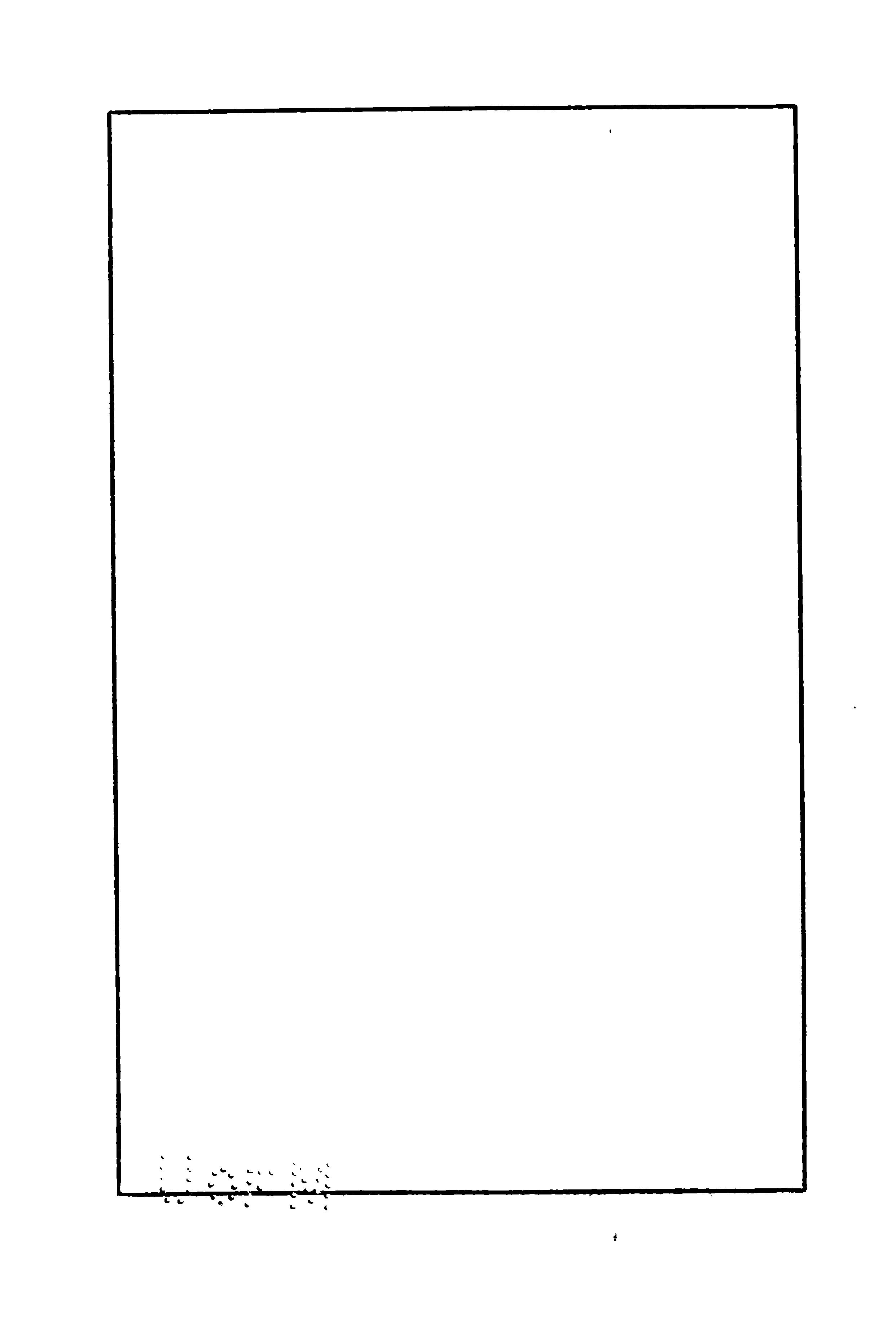

 BY PAUL CARUS
BY PAUL CARUS






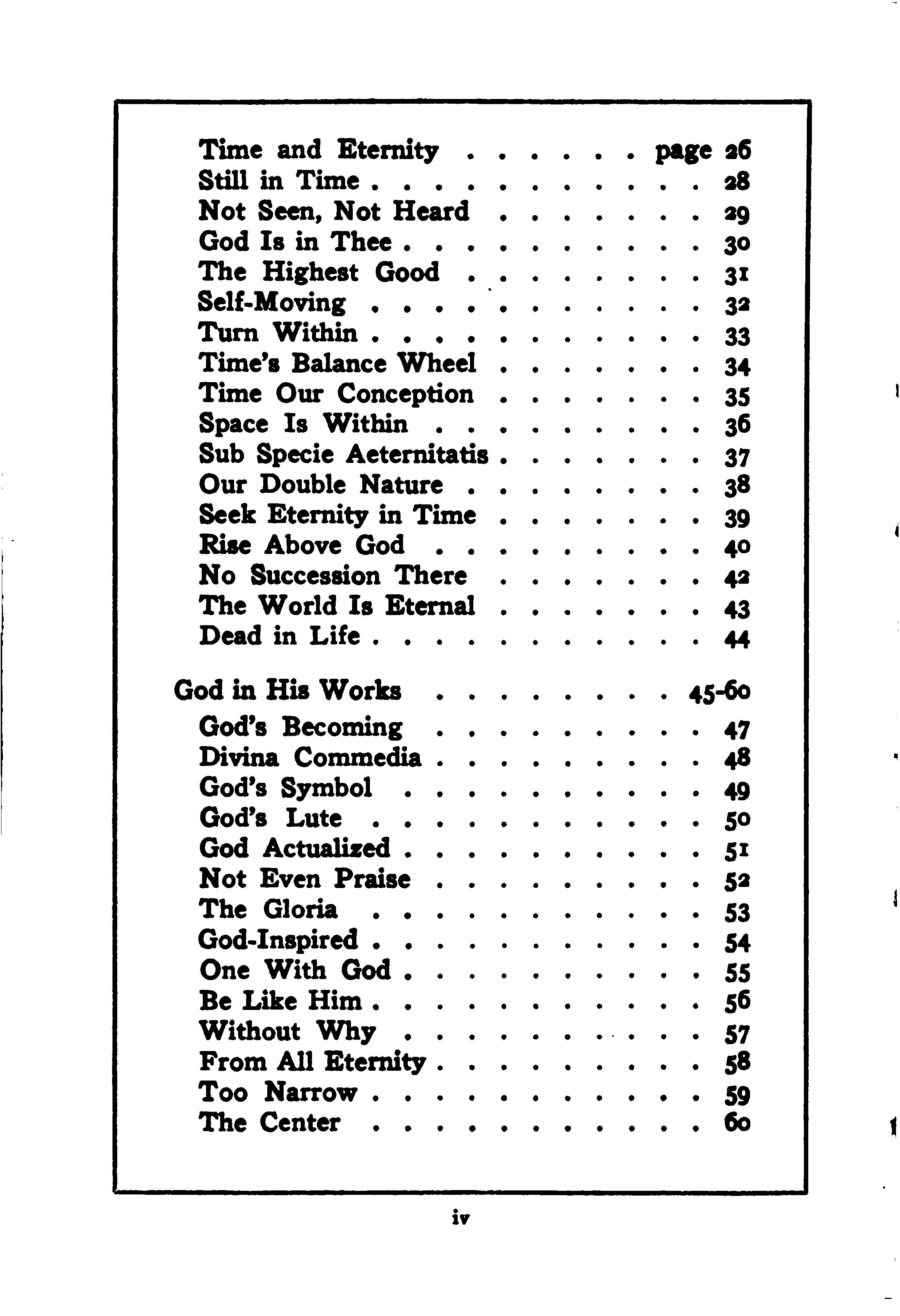














Johannes Scheffler, better known under the name of Angelus Silesius, was born of Protestant parents at Breslau, the cap ital of Silesia, in 1624, and was baptized in the same year on Christmas day. After passing through the usual course of edu cation at a gymnasium he attended the universities of Strassburg, Leyden and Padua where he studied medicine and phi losophy. At the last-mentioned place he took his doctor's decree in 1647. For three years, 1649-1652, he served as Court Physician to Duke Sylvius Nimrod of Oels, who was a pious but decidedly one sided Protestant.
Scheffler's mystic inclinations had long before alienated him from the dogmatic and anti-artistic spirit of the religion of his birth which during the middle of the seventeenth century was more severe and bigoted than ever before or afterwards. At the same time there was a religious revival in the Roman Catholic world

which proved attractive to him, and so it was but natural that in 1653 he finally severed bis old affiliations, and joined the Church that by the mystical glamor of its historical traditions and ritual was most sympathetic to him. It was then that he adopted the name Angelus Silesius, and forthwith called himself Scheffler Johannes Angelus Silesius.

The zeal with which Scheffler embraced Roman Catholicism made him unjust toward the Protestant persuasion and im- plicated him in very unpleasant contro- versies.
Having become "persona grata" in the aristocratic circles of Austria, Scheffler becarne Court Physician to the Emperor in 1654; ten years later, in 1664, he was appointed chief Master of Ceremonies at the court of the Prince Bishop of Breslau, with the title of Counsellor.
His devotion led him in 1661 to enter the Order of St. Francis, commonly called the Brotherhood of Minorites. Having fallen a prey to consumption, he died July 9, 1677, in the Institution of the Knights of the Cross of St. Matthew in Breslau.

We have tried in vain to find a likeness of Johannes Scheffler. The only portrait that we can discover is a caricature in an

Dr. Johannes Scheffler. (Detail of caricature, somewhat enlarged.)

invective lampoon entitled "Wohlver dientes Kapitel" (Well-deserved Chapter)
Scheffler's Signature. published in 1664, in which our mystic is represented äs a pedler of spectacles, rosaries, cards, dice, and other similar xiii
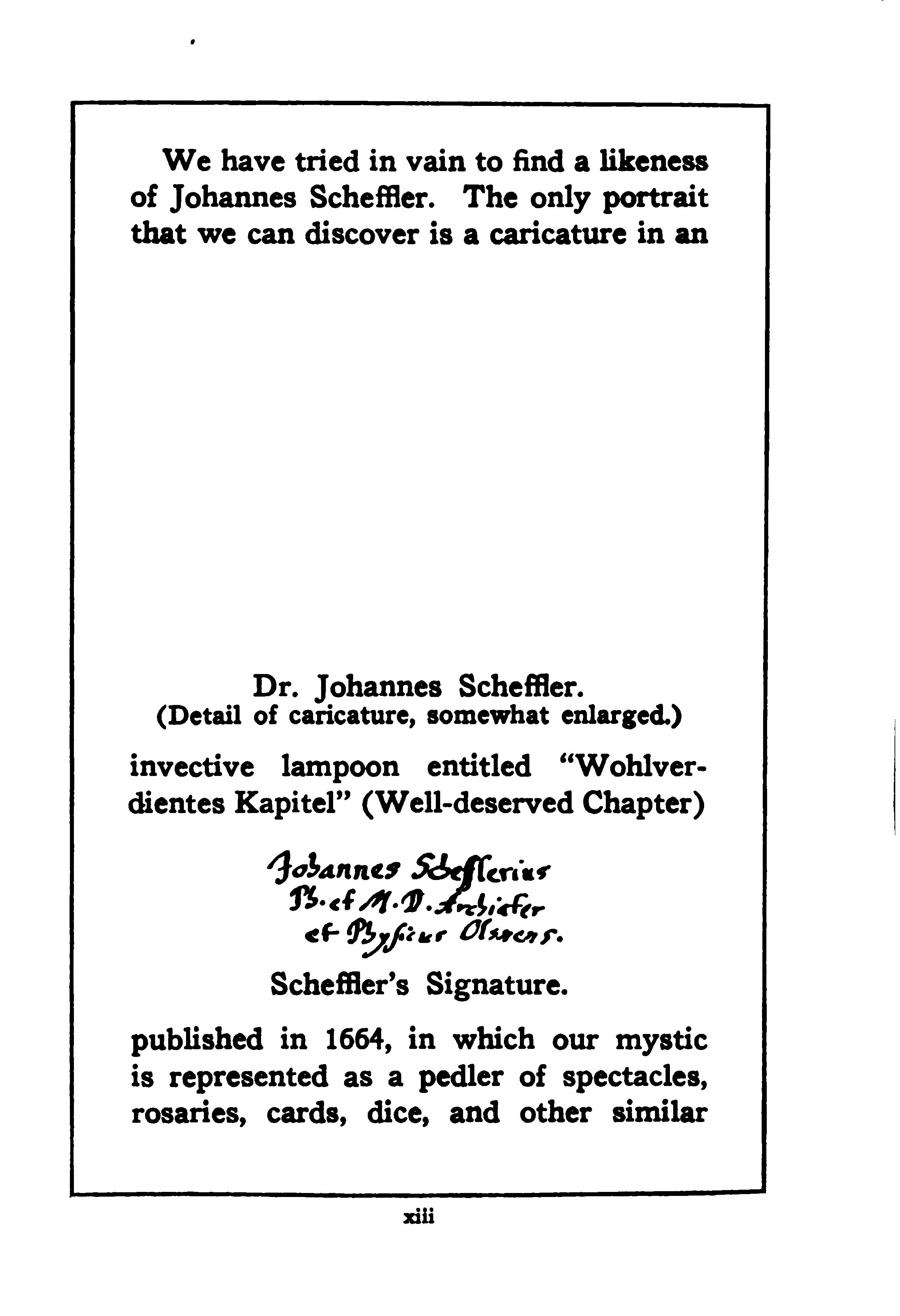
Caricature of Angelus Silesius. (Reproduced from a print of 1664. Consider- ably reduced.)

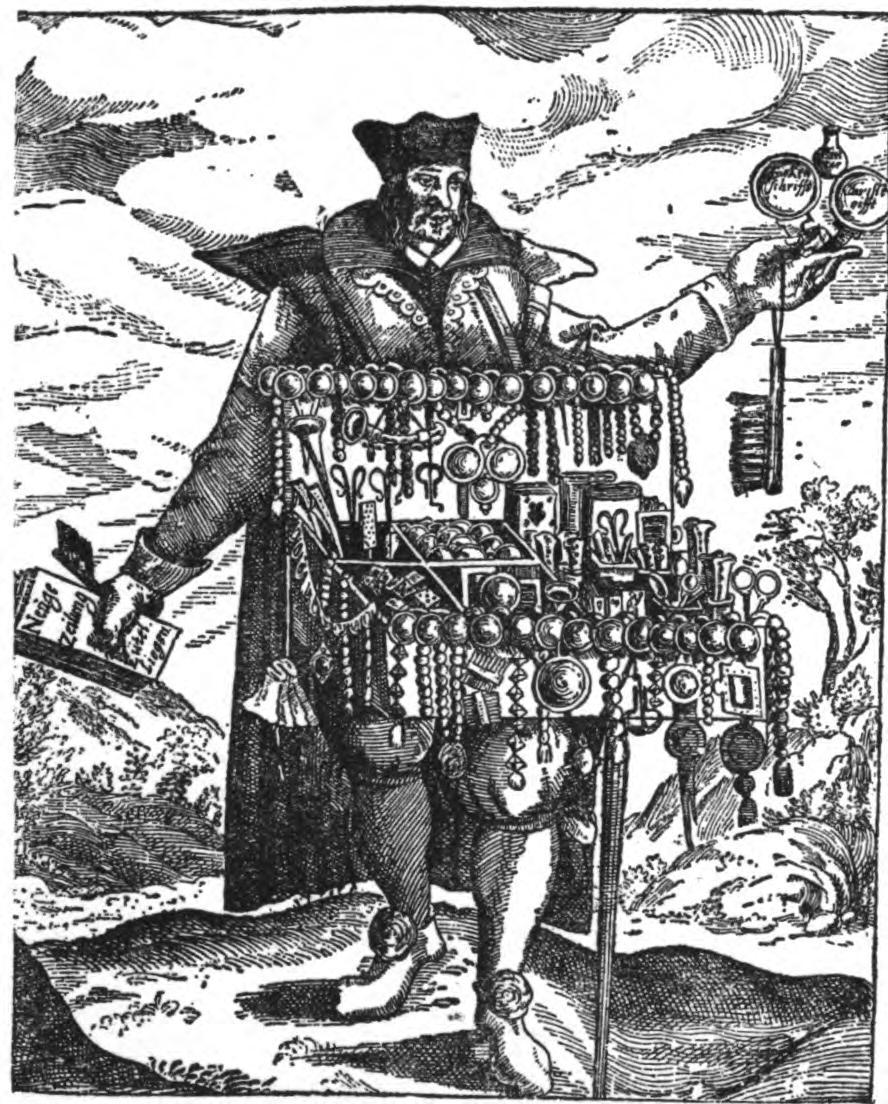

wares. No attempt has been made to disfigure the expression of his face, and we have reason to believe that it bears a certain likeness to the man.
In his signature he calls himself "Archiater et physicus Olsnensis," which means that he was court physician and surgeon of the small duchy of Oels in Silesia.
Though by education a physician and a scientist, Johannes Scheffler was a mystic and a poet. His most famous book is entitled "Cherubinischer Wandersmann" (The Cherubinean Wanderer), and it is from this that the present selection has been made. It was first printed by the Society of Jesus at Vienna in 1657 and was given the sanction of the Roman Catholic Church. The imprimatur reads as follows:

APPROBATIO.
Ego infrascriptus legi Domini Joannis Angeli Silesij libellum qui inscribitur "Geistreiche Sinn- und Schluss-Reime"; quo amoenitatem
lusumque Poeticum ita pietati sacrisque salibus miscet, ut Lectorem inde & recreandum spe

rem, & ad pios animi sensus commovendum. Ideoque dignum censui, qui luci publicae committeretur. Viennae ex Caesareo Academico Collegio Societatis Jesu die 2. Aprilis Anno i657.


Nicolaus Avancinus, £ Soc: Jesu, S. S. Theol: Doctor ejusdemque Facultatis Viennensis Decanus. Imprimatur.
Joannes Guilielmus
J u n c h e r, p. t. Vniversitats Rector.
The publication of the "Cherubinischer Wandersmann" was followed by that of another pious effusion called "Heilige Seelenlust oder geistliche Hirtenlust der in ihren Jesum verliebten Psyche." An gelus Silesius is also the author of several Church songs which breathe fervor and piety. As the best-known of bis hyrtins which are still in use, we cite the two beginning :
"Mir nach! spricht Christus, unser Held, Mir nach, ihr Christen alle," and
"Liebe, die du mich zum Bilde Deiner Gottheit hast gemacht."
Like Newman's "Lead, kindly light!" his hymns have become the common prop erty of both Roman Catholic and Prot estant churches. Some of his songs have been translated into English, notably, "Earth has nothing sweet and fair."
Angelus Silesius is very little known to English readers ; and we must grant that a perusal of all the 1676 little poems of his book would be extremely monotonous. But among the chaff there are golden grains, and we have selected the most striking verses, and offer them here to our readers as some of the most beautiful ex pressions of thought that has been pro duced by mysticism, not the mysticism of vagaries and vain speculations, such as characterize so many mystics of to-day, but the noble mysticism of Eckhart and Tauler, of Jacob Boehme and Franken berg, and mainly of Valentin Weigel, all of which are founded on a deep philosoph ical conception.

Mysticism endeavors to solve the prob lems of existence by sentiment where phi losophy offers intellectual statements in abstract formulas, and so we have a conxvii

trast here between two conceptions. The mystic is sensuous ; his religion is all feel ing, and he even exhibits a dislike for in tellectuality. On the other hand, the in- " tellectualist demands first of all clearness of thought and scorns the sentimentality of the mystic.
This contrast comes out well when we compare a quatrain of Angelus Silesius with one of Schiller's Xenions. Angelus Silesius contemplates with satisfaction that religion appeals to the senses. He says:
"Hope gropeth after God, Faith grasps His vision dim; Love on His bosom leans, Devotion eateth Him."

"Der Glaube greift nach Gott; Die Hoffnung nimmt ihn wahr; Die Lieb umhalset ihn; Die Andacht isst ihn gar."
III, 230.
How different is Schiller who, though a poet of great force, scorns the sensuality of mystics whom he calls "Theophagi" or God-eaters and censures them in this dis tich:
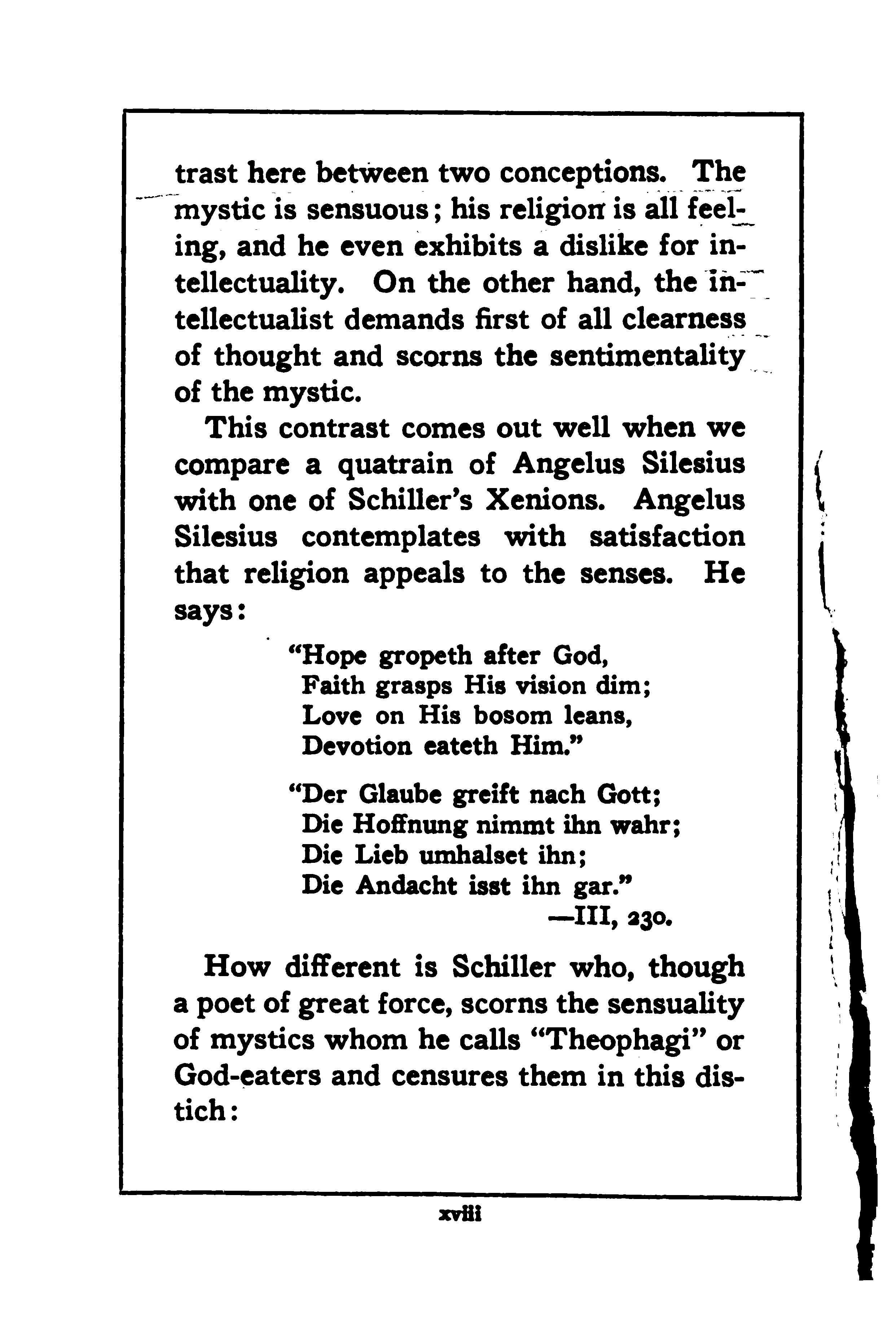
"All is enjoyment with them, They eat and they relish ideas. E'en into heaven to God Spoons they will carry and forks."

"Diesen is alles Genuss. Sie essen Ideen, und bringen In das Himmelreich selbst Messer und Gabel hinauf."
We will not decide between the two views. We simply state the difference and will recognize the right of every one to be as he is. No doubt but there is a danger in mysticism when it revels in symbols and delights in an unstinted dis play of feeling. On the other hand we must bear in mind that pure intellectualism is as cold as the glaciers of Alpine heights, and in spite of its loftiness it leaves a longing for that warmth of senti ment which so richly pervades mysticism.
* * * The first edition of the "Cherubinischer Wandersmann" appeared in 1657 and bears a quaint frontispiece which we have reproduced to occupy a similar position in the present edition. It pictures the xix

soul soaring aloft on an eagle toward a six-pointed star. The sun is the Symbol of the Trinity, äs indicated by the three marks on its disk. On a cliff at the left side lies a mariners' compass with the inscription, "Es zeigt den rechten Weg," (It points out the right path). Underneath an allegorical figure rings a bell below which we read, "Es wecket auf vom Schlaffe," (It awakens from slumber). On a rock at the right-hand side a hand is seen lighting a candle from a burning taper. The explanation reads, "Es zündt andren," (It kindles for others). The alle gorical figure in the lower right-hand corner is taking from a beehive a wafer which is the symbol of the Sacrament, and words underneath declare, "Es speist und schmekt süsse," (It nourisheth and tasteth sweet). In the background lies a city, the heavenly Jerusalem. On the back of the frontispiece of the first edition we read the verse :


"Ein Mensch der schauet Gott, Ein Thier den Erdkloss an; Aus diesem, was er sey, Ein jeder kennen kann."
"A man beholdeth God, A brüte the clod of earth; Hence every one may know His nature and bis worth."

The translator is not a mystic if by mysticism is understood the supremacy of the emotional in the domain of human mentality, or even if the term presupposes the doctrine of agnosticism, that the main Problems of philosophy and religion lie outside the pale of human cognition. He believes, however, that the short cut taken by the emotions for the sake of rightly attuning the soul to God is a very helpful expedient by which those natures that lack intellectual power may gain a substi- for truth. His views on this subject have been expressed in a special article in "The Monist" entitled "Mysticism."* Being in sympathy with such men äs Tauler, Eckhart, Scheffler, Boehme and others, he wishes to set forth a typical mystic character and trusts that Angelus Silesius will best serve this purpose.
* "Monist," XVIII, 75.

Though Angelus Silesius was an extraordinarily zealous Roman Catholic it may appear to most readers very difficult to conciliate his mysticism with Church doctrines, unless it be granted that the Chris tian dogmas are exoteric and admit of an esoteric Interpretation. By the side of the pious fervor which permeates his poems, there is an undercurrent of the most radical thought which, if it were expressed in prose and without the religious intent, would be regarded by many äs sheer infidelity. In the same way äs in the mysticism of the Friends of God and other mystical movements, Christian dog mas loorn up in the background of the thoughts of Angelus Silesius, but to him the dogma is of little importance in comparison to its meaning. We feel that to the mystic it is of no consequence whether the data of the life of Jesus are true or not, but it is of paramount importance to him that God should be born in man's own soul. Our own deification is the whole bürden of the story of Christ, and in the same way all the dogmas have no other purpose than to symbolize Spiritual


truths to help us actualize them in our own lives.
The God-conception of Angelus Silesius, if expressed in a dry dogmatic for mula, appears pure atheism. He speaks of God as a mere naught, and even less than naught; he denies that the deity thinks; he does not believe in providence because God can not see ahead. God is nowhere, and the expression "God is" is a mere "soi disant," a trope, i. e., an expression which can not be taken literally, in the sense in which we speak of ourselves as existing.* If God could be said to be something he would be such only in name.

The views of self in the "Cherubinean Wanderer" of Angelus Silesius, like the views of other mystics, e. g., the auther of "Theologia Germanica," are quite Bud-
*The use of "eigentlich" in the line here
referred to is very idiomatic. When Angelus Silesius says: "Gott ist nur , eigentlich, he means: "If we say, 'God is,' the words are to be taken as true, 'nur eigentlich,' i. e., only in a particular sense." The word "eigentlich" is derived from "eigen," i. e., "own," or "proper" and may pretty literally be translated by "prop erly speaking." The phrase "nicht eigentlich" means "not exactly," and "nur eigentlich," "only in a special sense."

dhistic, and salvation consists in freeing one's self from egotism and all the nar rowing limitations of selfhood. We are saved by self-annihilation. Nevertheless the soul of man is divine, provided the idea of selfhood be overcome. Indeed, it is as great as God himself, yea it may be more than God. The Soul is infinite and heaven and earth are too small for it.

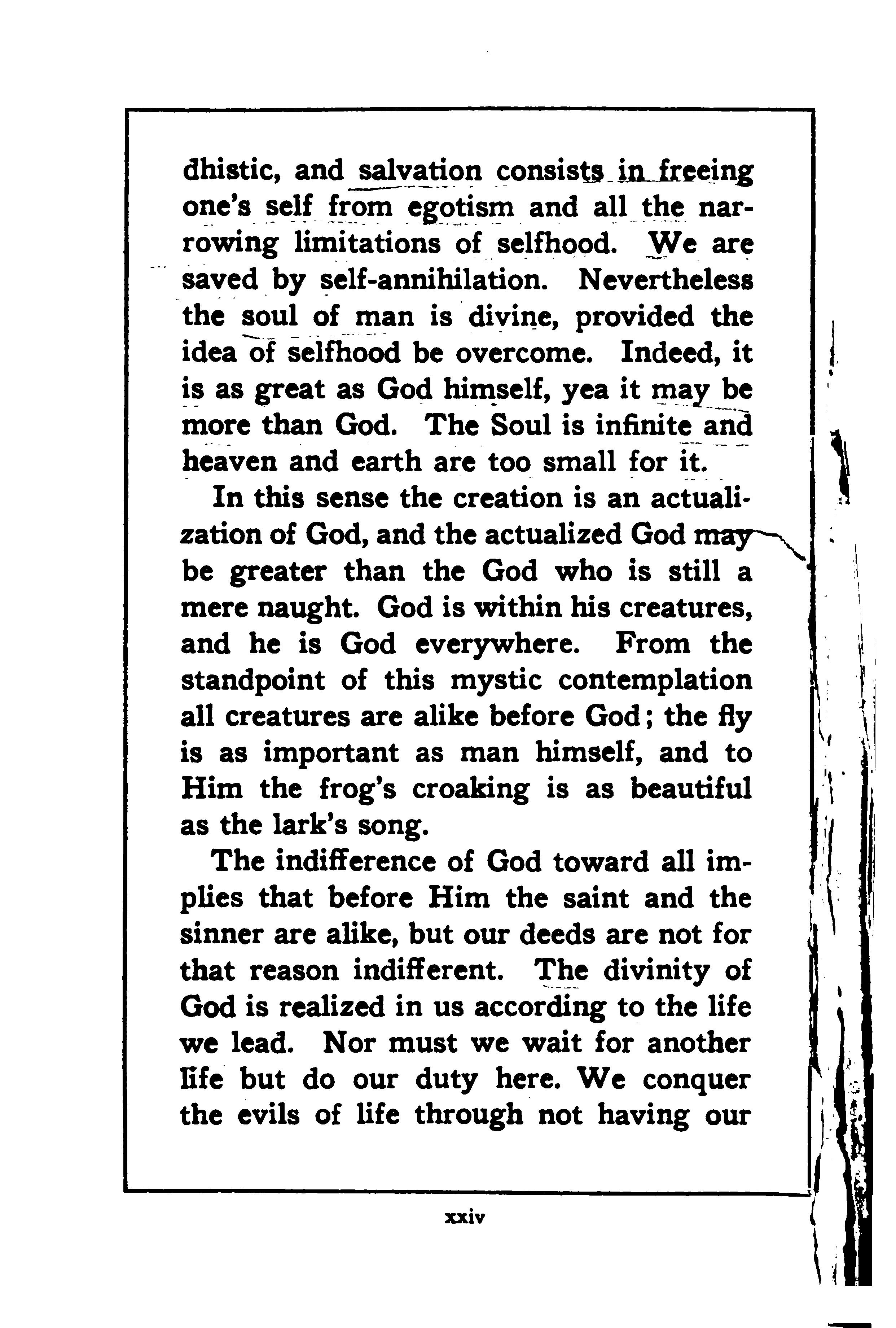
In this sense the creation is an actuali zation of God, and the actualized God may be greater than the God who is still a mere naught. God is within his creatures, and he is God everywhere. From the standpoint of this mystic contemplation all creatures are alike before God ; the fly is as important as man himself, and to Him the frog's croaking is as beautiful as the lark's song. |
The indifference of God toward all im plies that before Him the saint and the sinner are alike, but our deeds are not for that reason indifferent. The divinity of God is realized in us according to the life we lead. Nor must we wait for another life but do our duty here. We conquer the evils of life through not having our
own will, but doing God's will. Death is called our best friend, because he is the liberator from selfhood, and the thought of seif nothing eise is hell. When body and soul are healed (i. e., at the termina- tion of our life) we become God ourselves.

* * * There is a thoughtful pun in one of the epigrams on time. The balance-wheel of a clock is called "Unruhe" in German, "which, literally translated, means "un- rest." Time is made, says Angelus Sile
sius, by the clock-work of our senses; if we stop the balance in us, which is the restlessness of our heart, we stop time itself and live in eternity.
The reader notices that here Angelus Silesius anticipates Kantian idealism. Not only lies the center of the world and all its wealth within ourselves, but even time and space are declared to be functions of the soul. They are parts of our "Welt begriff," i. e., our conception of the world.
The coincidence of the views of An gelus Silesius with those of Kant seems stränge, but both are apparently based

on older traditions. Valentin Weige^pro- pounded the same views before Angelus iniesius and Swedenborg after him, yet before Kant. How far any one of these men has influenced his successors is a question that has caused much discussion.
It is interesting to note that Leibnitz speaks of Angelus Silesius in two pas sages, comparing his philosophical views to Spinoza's system, and this is perhaps natural for we cannot doubt that our mystic poet has devoted much thought to speculative philosophy.

Yet Angelus Silesius would be no mys tic if he rated comprehension higher than sentiment. It is true he prizes only that simplicity of heart which is accompanied with wisdom and scorns that simplicity which is mere stupidity, but he places love higher than knowledge and science, for through love only we gain an im mediate admission into God's presence. * * *
The present edition contains the orig inal German* but is not intended as a
* The entire collection consists of six books, and for the benefit of students who may be

contribution to Germanic philology, and therefore we would deem it improper to burden the book with annotations con cerning the oddities of Schemer's lan guage. Upon the whole the spelling of the original has been retained, but in some cases where the sense was not the least affected more modern readings have been preferred.

Any one who is even superficially ac quainted with Germanic philology will find no difficulties whatever, but there are a few pitfalls to readers familiar with modern German only, to which we might here quite incidentally call attention. "Witz," "wit," (p. 122) means wisdom, Snot smartness. "Der Schlaf" (p. 160) is the genitive plural, the grammatical con struction being, "Of sleeps there are three kinds." "Gemein" (p. 69 and p. 99) is to be taken in the literal sense "to com mune," not in the modern sense, "vulgar." We must bear in mind the German original with its crude rhymes and archaic interested in comparing original readings, we have inserted after each German quatrain its reference to book and verse of the original col lection.

language if we want to appreciate An gelus Silesius in an English translation, and a close study of these epigrams has convinced us that the naivete of the style is particularly adapted to the thought, both of which we have endeavored to pre serve in our English version. We are convinced that no one can read these verses, be he religiously inclined or not, without being interested in the man and in his attitude towards the world.






We say God needeth naught, For gifts He doth not pine; If that be true, why wants He this poor heart of mine?


Man sagt, Gott mangelt nichts, Er darf nicht unsrer Gaben: Ists wahr was will er dann Mein armes Herze haben?
-III, 123-
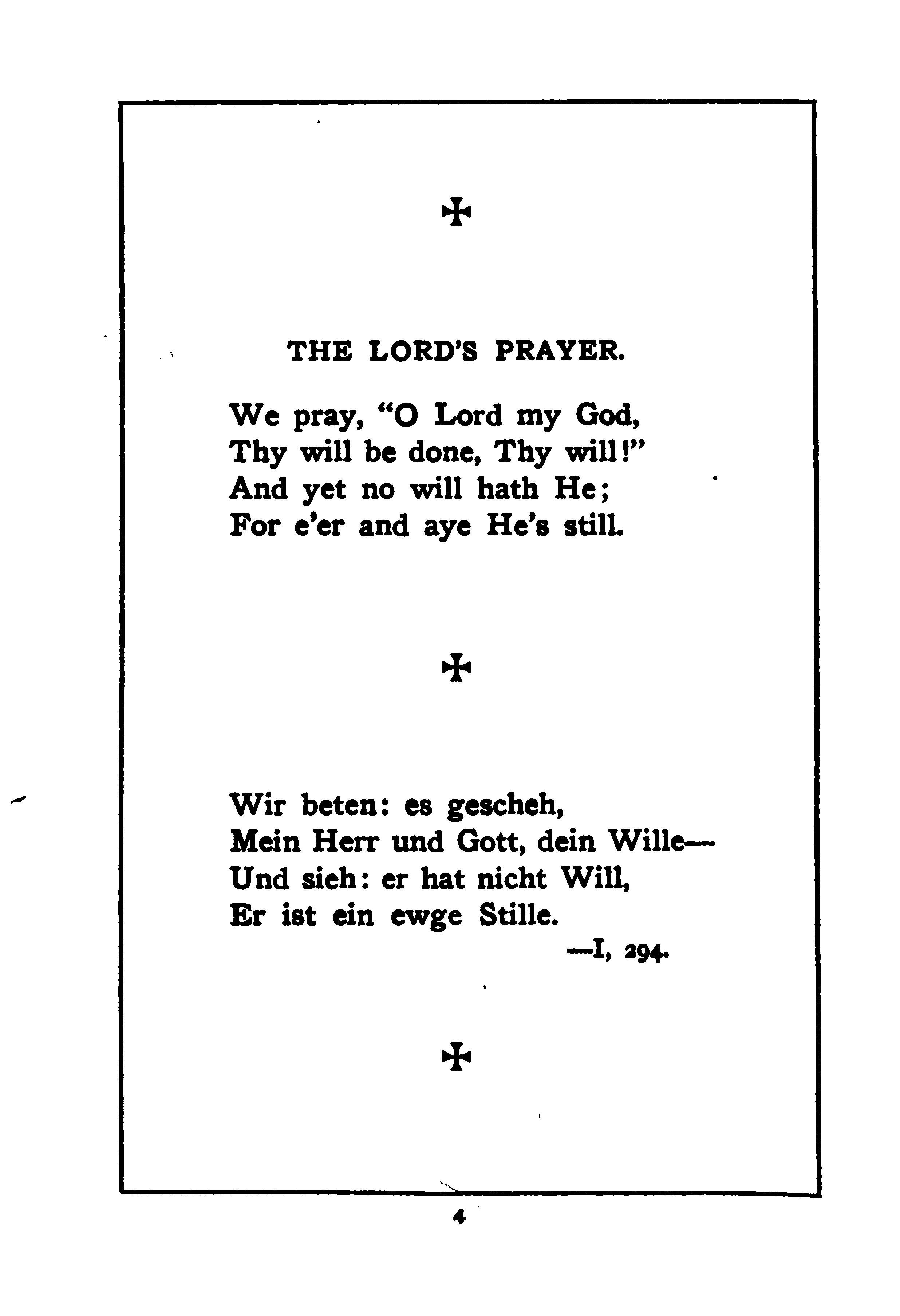
We pray, "O Lord my God, Thy will be done, Thy will!" And yet no will hath He; For e'er and aye He's still.

Wir beten: es gescheh, Mein Herr und Gott, dein Wille Und sieh: er hat nicht Will, Er ist ein ewge Stille.
I, 294.
God resteth not himself, Nor in exertion irketh. His very work is rest, Yet while He rests, He worketh.


Gott hat sich nie bemüht, Auch nie geruht, das merk
Sein Wirken ist sein Ruhn Und seine Ruh sein Werk.
IV, 166.
God is the purest naught, He hath nor now nor here. The more thou grop'st for Hirn, The more He'll disappear.


Gott ist ein lauter Nichts, Ihn rührt kein Nun noch Hier. Je mehr du nach ihm greifst Je mehr entwird er dir.
aS.The tender Deity Is naught and less than naught. Who naught in all things sees. He finds God whom he sought.
Die zarte Gottheit ist Ein Nichts und Uebernichts: Wer nichts in allem sieht, Mensch, glaube, dieser sichts.

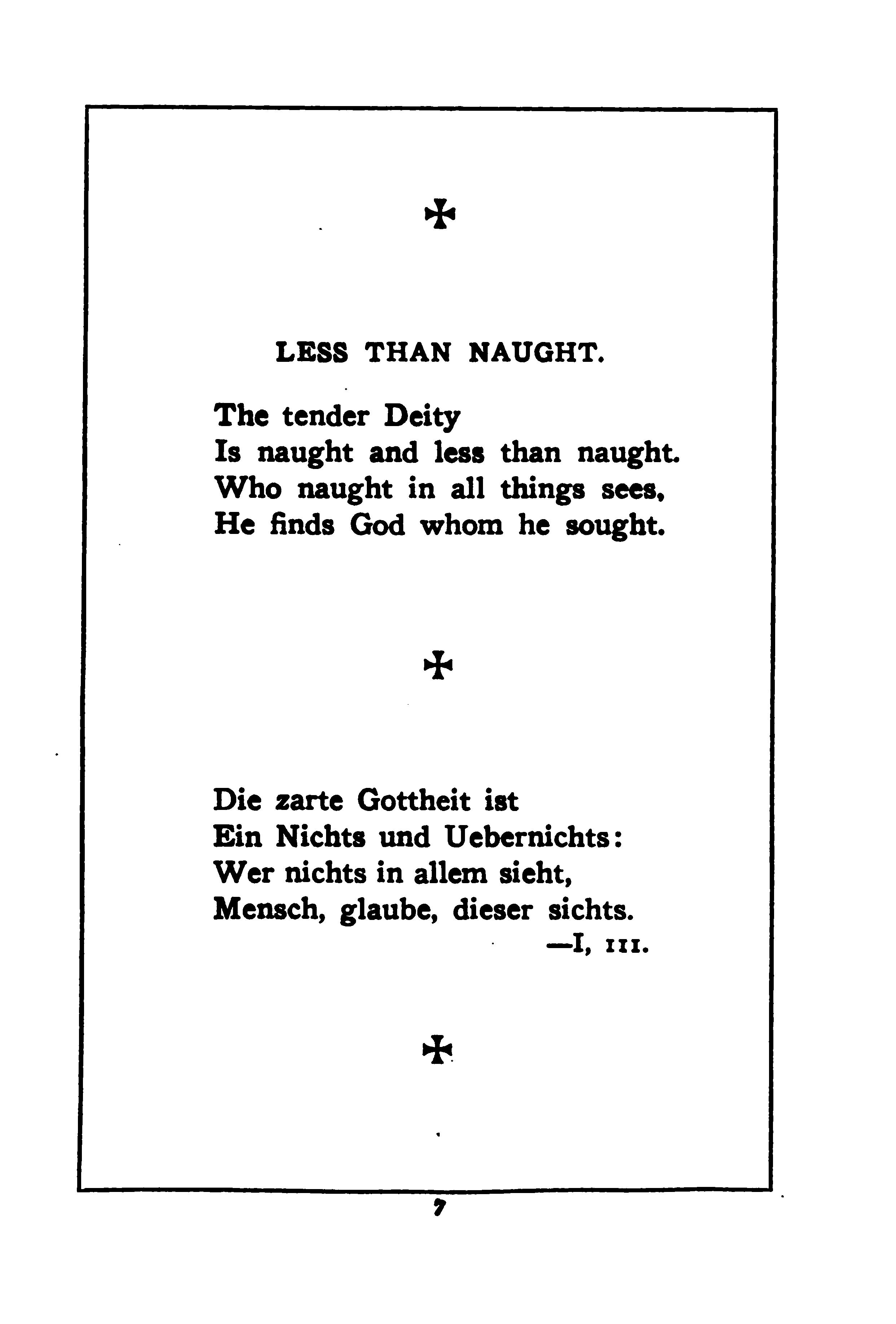
God thinketh naught; for if He thought, or planned, or wot, His mind would vacillate, And that behooves Hirn not.

Mensch, Gott gedenket nichts. Ja, wär'n in ihm Gedanken, So könnt er hin und her Was ihm nicht zusteht wanken.
 -V, 173.
-V, 173.
God never looks ahead; And thus it is a He, Whene'er to measure Him By providence you try.

Gott siehet nichts zuvor Drum lügst du wenn du ihn Mit der Vorsehung misst Nach deinem blöden Sinn.

MERE TROPE. Mere trope to say God "is"! Nor loves, nor thinketh He As creatures, such as I And you, are said to be.


Gott ist nur eigentlich, Er liebt und lebet nicht, Wie man von mir und dir Und andren Dingen spricht.
II, 55
ASKING GIFTS. Who asketh gifts of God, How piteously he strayeth! He to a creature, not To the Creator prayeth.

Wer Gott um Gaben bitt't, Der ist gar übel dran : Er betet das Geschöpf Und nicht den Schöpfer an. I, 174.

Think'st thou, poor man, if thou In song thy voice loud raisest, That in the proper way The quiet God thou praisest?
Meinst du, o armer Mensch, Dass deines Munds Geschrei Der rechte Lobgesang Der stillen Gottheit sei?

Ii 339-
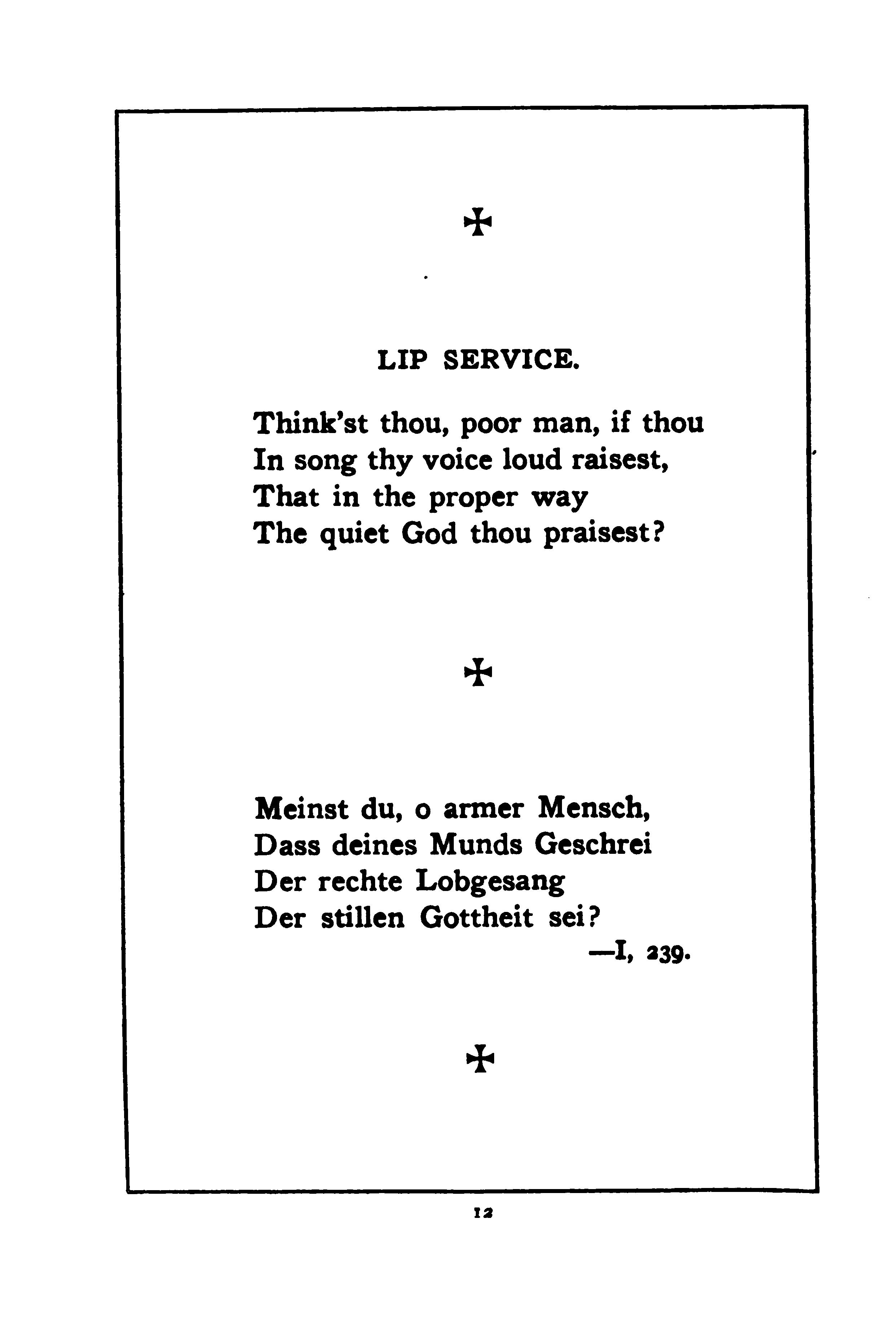
God is all virtue's end, It's mainspring He's likewise. He too is virtue's cause, He eke is virtue's prize.

Gott ist der Tugend Ziel, Ihr Antrieb, ihre Krön, Ihr einziges Warum Und ist auch all ihr Lohn.
IV, 18.

Thou needst not cry to God, The spring wells up in thee. Unless thou stop its source, 'T will flow eternally.

Du darfst zu Gott nicht schrein, Der Brunnquell ist in dir: Stopft'st du den Ausgang nicht, Er flösse für und für.
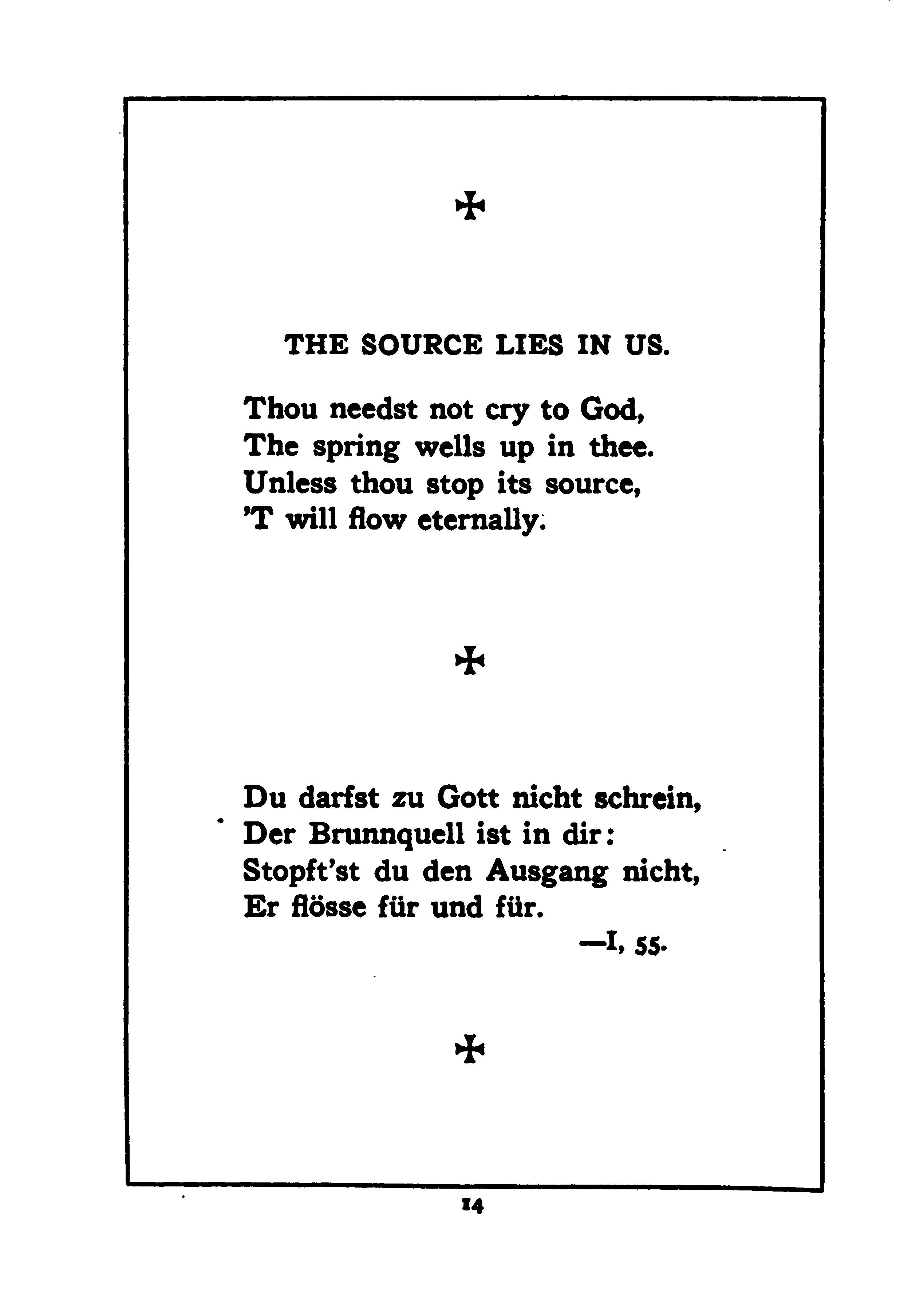 -I, SS-
-I, SS-
Ich weiss, dass ohne mich Gott nicht ein Nu kann leben: Werd ich zu nicht er muss Von Noth den Geist aufgeben. 1,8.


I know, deprived of me, God could not live a wink. He must give up the ghost If into naught I sink.
God loves me more than Him ; Than me I love God more. So He gives me as much As I to Him restore.

Gott liebt mich über sich : Lieb ich ihn über mich, So geb ich ihm soviel, Als er mir gibt aus sich.

GOD MINE END.

God is my final end; Does He from me evolve, Then He grows out of me, While I in Hirn dissolve.

Gott ist mein letztes End: Wenn ich sein Anfang bin, So weset er aus mir Und ich vergeh in ihn.
I, 276.
ALL SENSES ARE BUT ONE. In spirit senses are One and the same. 'T is true, Who seeth God he tastes, Feels, smells and hears Hirn too.
Die Sinne sind im Geist All' ein Sinn und Gebrauch: Wer Gott beschaut, der schmeckt, Fühlt, riecht und hört ihn auch. V, 351.



In God nought e'er is known, Forever one is He. What we in Hirn e'er know, Ourselves must grow and be.
In Gott wird nichts erkannt: Er ist ein einig Ein. Was man in ihm erkennt, Das muss man selber sein. I, 285.

God never did exist, Nor ever will, yet aye He was ere worlds begsn, And when they're gone He'll stay.
Gott ist noch nie gewest Und wird auch niemals sein Und bleibt doch nach der Welt, War auch vor ihr allein.

III, 181.

God Father is a point, God Son the circuit line, And God the Ghost does both As area combine.

Gott Vater ist der Punkt ; Aus ihm fleusst Gott der Sohn, Die Linie; Gott der Geist Ist beider Fläch und Kron.
IV, 62.

What has been said of God Does not suffice, I claim. The Over-Godhead is My life, my light, my aim.

Was man von Gott gesagt, Das g'nüget mir noch nicht: Die Ueber-Gottheit ist Mein Leben und mein Licht. -I, 15.





I am (what majesty!)
Eternity's own son; By birth a noble king, God's glory on a throne.

Ich bin o Majestät!
Ein Sohn der Ewigkeit, Ein König von Natur, Ein Thron der Herrlichkeit. IV, 226.


Who time takes not as time, Whose sorrow is no sorrow, Whose yest'reen is to-day And whose to-day is morrow, Who counteth all the same: He e'en in time will be In the longed for estate Of sweet eternity.

Wer Zeit nimmt ohne Zeit
Und Sorgen ohne Sorgen, Wem gestern war wie heut Und heute gilt, wie morgen, Wer alles gleiche schätzt : Der tritt schon in der Zeit In den gewünschten Stand Der lieben Ewigkeit.


Here, flow I still in God, A brook of time, ywis; There, I myself shall be The sea of lasting bliss.
Hier fleuss ich noch in Gott

Als eine Bach der Zeit Dort bin ich selbst das Meer Der ewgen Seligkeit.
-IV, 135-

Go where thou canst not walk; See what thou canst not see ; Hear what is without sound, And where God speaks, thou'lt be.

Geh hin, wo du nicht kannst, Sieh, wo du stehest nicht, Hör, wo nichts schallt noch klingtSo bist du wo Gott spricht.
I, 199-


Stop man! where dost thou run?
Heav'n lies within thy heart.
If thou seek'st God elsewhere, Misled, in truth, thou art.
Halt an! Wo laufst du hin?
Der Himmel ist in dir.
Suchst du Gott anderswo, Fehlst du ihn für und für. -I, 82.

THE HIGHEST GOOD. Rest is the highest good ; And if God were not rest, For Hirn I'd close mine eyes To make Hirn truly blessed.


Ruh ist das höchste Gut Und wäre Gott nicht Ruh, Ich schlösse für ihn selbst Mein beiden Augen zu.
-I, 49-
Naught is that pusheth thee Thyself, thou art the wheel Which turneth by itself And never rest will feel.

Nichts ist das dich bewegt Du selber bist das Rad, Das aus sich selbsten lauft Und keine Ruhe hat.
-I, 37-

Whoe'er his senses turns Within his soul, he findeth, That what's not said he hears, He sees when night him blindeth.

Wer seine Sinnen hat Ins Innere gebracht, Der hört was man nicht redt, Und siehet in der Nacht.
V, 129.

Yourself you make the time, Your senses are the clock. You stop the balance wheel, And time at once you block.
Du selber machst die Zeit, Das Uhrwerk sind die Sinnen; Hemmst du die Unruh nur, So ist die Zeit von hinnen. -I, 189.


TIME OUR CONCEPTION.


They say that time is swift. Whoever saw it fly? Within our world of thought Unmoved we find time lie.
Man sagt, die Zeit ist schnell Wer hat sie sehen fliegen? Sie bleibt ja unverrückt Im Weltbegriffe liegen.
-V, 23-

Thou art not in a place, The place thou'lt find in thee. Discard it, and e'en now Appears eternity.
Nicht du bist in dem Ort, Der Ort, der ist in dir : Wirfst du ihn aus, so steht Die Ewigkeit schon hier. -1, 185.

No after nor before! What shall to-morrow be In its true essence, God Sees in eternity.

Es ist kein Vor noch Nach: Was morgen soll geschehn, Hat Gott von Ewigkeit Schon wesentlich gesehn.
II, 182.


Two eyes our souls possess: While one is turned on time, The other seeth things Eternal and sublime.
Zwei Augen hat die Seel: Eins schauet in die Zeit, Das andre richtet sich Hin in die Ewigkeit.
III, 228.

Eternity is time And time eternity, Except when we ourselves Would make them different be.
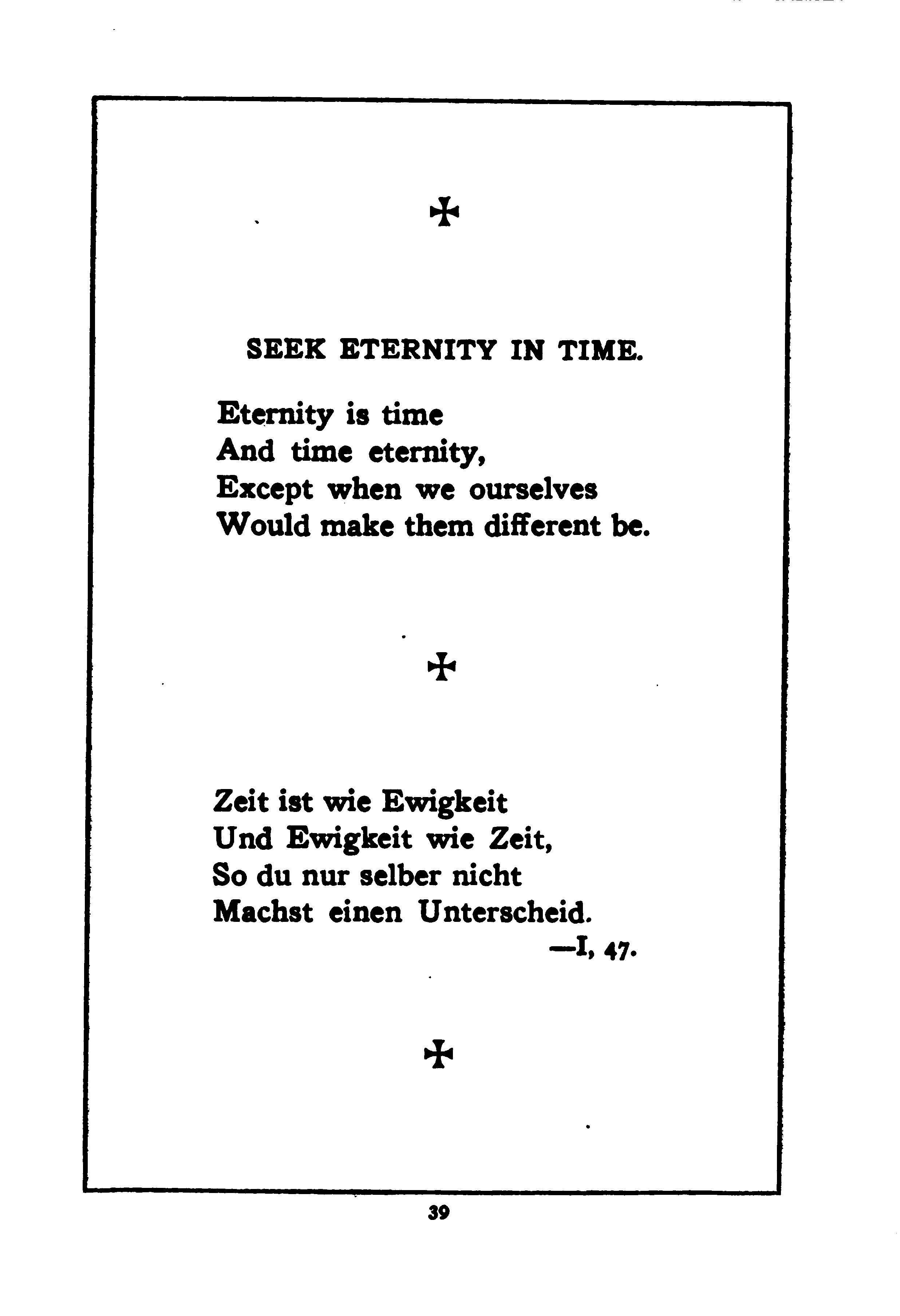
Zeit ist wie Ewigkeit Und Ewigkeit wie Zeit, So du nur selber nicht Machst einen Unterscheid.
-I, 47.



"Where is my residence?"
Where I nor you can stand.
"Where is the final end
Where I at last shall land?"
'T is where no end is found:
"And whither must I press?"
Above God I must pass, Into the wilderness.
Wo ist mein Aufenthalt?

Wo ich und du nicht stehen.
Wo ist mein letztes End, In welches ich soll gehen?
Da, wo man keines find't.
Wo soll ich denn nun hin?
Ich muss noch über Gott In eine Wüste ziehn. -I,
7

Are all at once in prime, No after nor before Is there, äs here in time.
Dort in der Ewigkeit
Geschiehet all's zugleich, Es ist kein vor noch nach Wie hier im Zeitenreich.
 -V, 148.
-V, 148.

Since the Eternal God Made in eternity

The world, it's clear as day That it eternal be.
Weil Gott, der ewige, Die Welt schuf ausser Zeit, So ist's ja sonnenklar, Dass sie von Ewigkeit.
V, 146.
The sage will never die?

Why, dead e'en now is he; Alive alone in God, Dead to all vanity.

Der Weise stirbt nicht mehr?
Er ist zuvor schon tot, Tot aller Eitelkeit, Tot allem, was nicht Gott.
VI, 241.





The uncreated God In time grows here to be What ne'er He could become In all eternity.
Der ungewordne Gott Wird mitten in der Zeit, Was er nie war noch ward In aller Ewigkeit.
 -IV, i.
-IV, i.

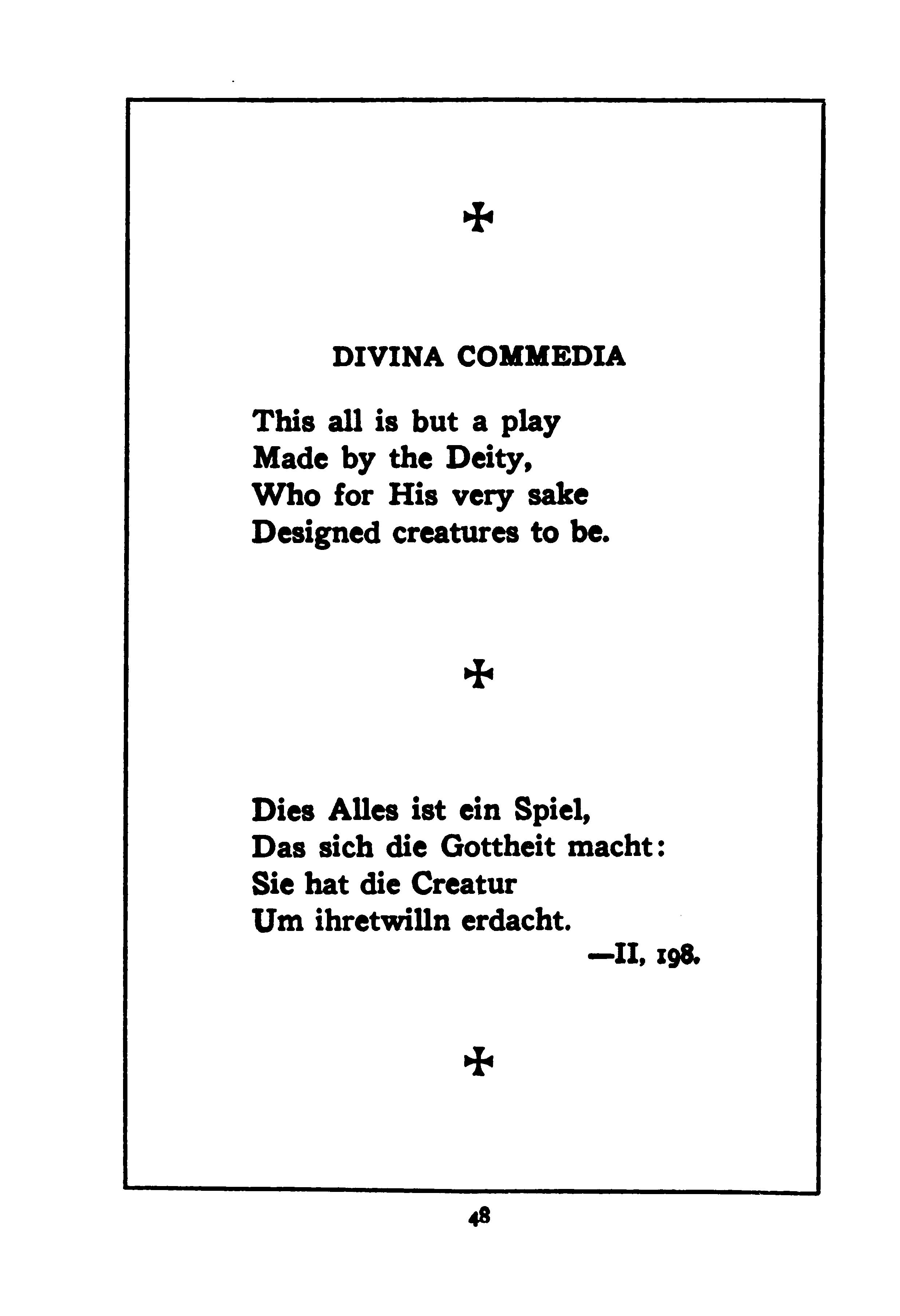
This all is but a play Made by the Deity, Who for His very sake Designed creatures to be.
Dies Alles ist ein Spiel, Das sich die Gottheit macht: Sie hat die Creatur Um ihretwilln erdacht.
-II, 198.

What in eternity
God wants and has devised, His thoughts in me He now Beholdeth symbolized.
Was Gott in Ewigkeit Begehrn und wünschen kann, Das schauet er in mir Als seinem Gleichnis an.
I, 272.
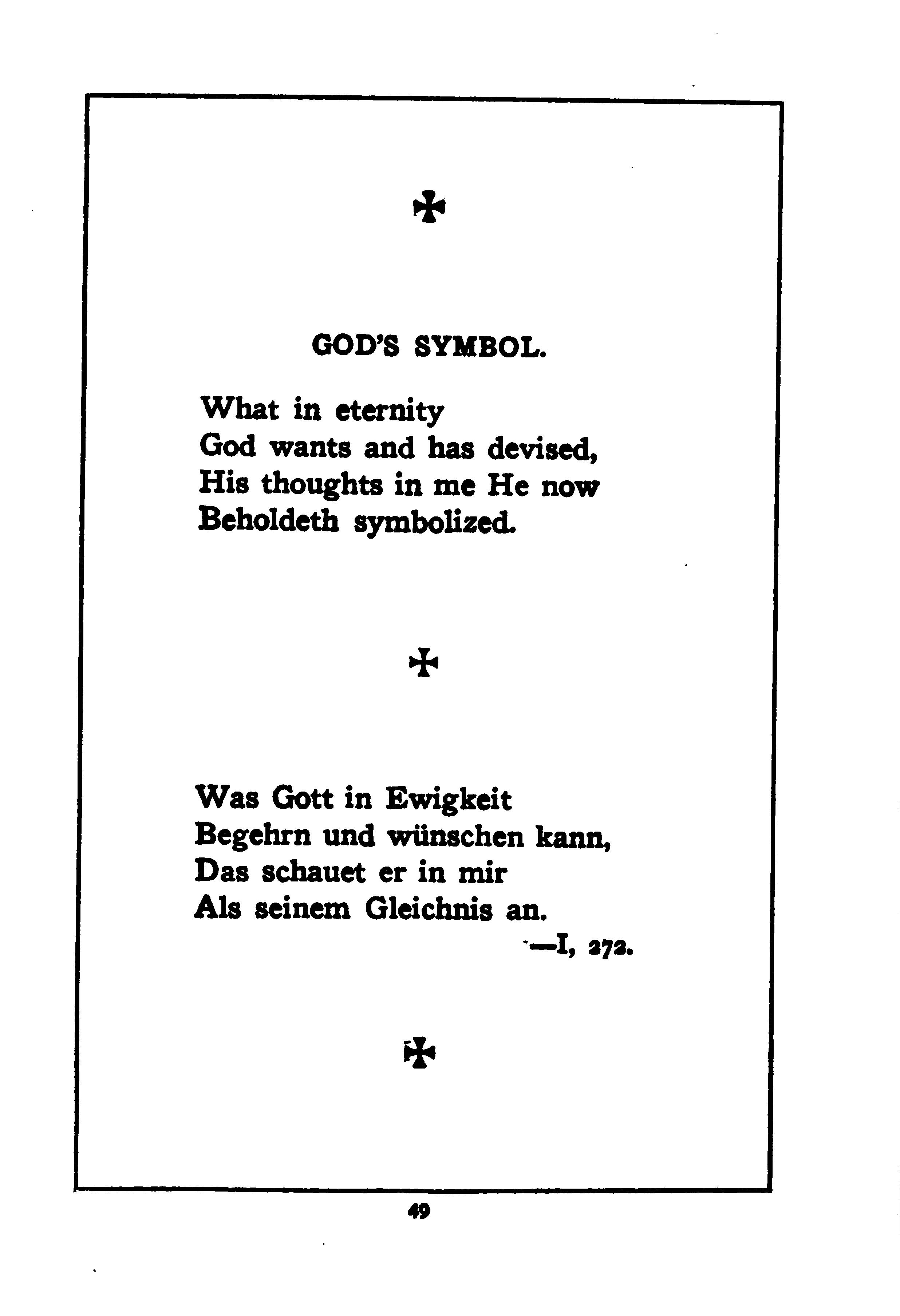
GOD'S LUTE.


A heart that to God's will Submits in patience mute, Loves to be touched by Him: It serves God as His lute.
Ein Herze das zu Grund Gott still ist, wie er will, Wird gern von ihm berührt Es ist sein Lautenspiel.
V, 366.
God is indeed pure naught, Yet if He something were, He'd only be't in me, His chosen minister.
Gott ist wahrhaftig nichts, Und so er etwas ist, So ist er's nur in mir, Wie er mich ihm erkiest.
 I, 200.
I, 200.
NOT EVEN FRAISE. How blessed is the man Who willeth not nor knoweth, And who hear me aright! On God no praise bestoweth.

Wie selig ist der Mensch, Der weder will noch weiss, Der Gott versteht mich recht !Nicht giebet Lob noch Preis. -I, 19.


Whoever with one glance Above himself can soar, He with God's angels can Sing Gloria evermore.

Wer sich nur einen Blick
Kann über sich erschwingen, Der kann das Gloria Mit Gottes Engeln singen.
-II, 73-
GOD-INSPIRED.

The Godhead is the sap By which I grow and blow; Its holy spirit 'tis That me inspireth so!
Die Gottheit ist mein Saft Was aus mir grünt und blüht, Das ist ihr heiiger Geist, Durch den der Trieb geschieht. I, 90.


God is in me the fire, And I, beam of his light. Thus we together are, And closely we unite.
Gott ist in mir das Feur Und ich in ihm der Schein : Sind wir einander nicht Ganz inniglich gemein?
-I, ii.

God is eternal rest, For naught e'er willeth He. If naught thou willest, thou As much äs God shalt be.

Gott ist die ewge Ruh, Weil er nichts sucht noch willWillst du ingleichen nichts, So bist du eben viel. -I, 76.

The rose is without why. It blows because it blows. It thinks not of itself, And no display it shows.

* Die Ros' ist ohn Warum, Sie blühet weil sie blühet; Sie acht nicht ihrer selbst, Fragt nicht, ob man sie siehet.
I, 28g.

FROM ALL ETERNITY. The rose which here unto Thine outer eye is shown, From all eternity Thus in God's sight hath blown.


Die Rose, welche hier Dein äussres Auge sieht, Die hat von Ewigkeit In Gott also geblüht.
I, 108.
The world too narrow is For me, and Heav'n too small. Where then for this my soul Shall I find room at all?

Die Welt ist mir zu eng, Der Himmel ist zu klein: Wo wird doch noch ein Raum Für meine Seele sein?
-I, 187.

The circle in a point Lies centered, fruit in seed, God in the world. WhcTseeks Hirn there is wise indeed.

Der Umkreis ist im Punkt, Im Samen liegt die Frucht, Gott in der Welt wie klug Ist, der ihn drinnen sucht.
-IV, 158.






Naught stronger is than God, Yet can He not forfend, That I whate'er I will Should not will nor intend.

Nichts stärkres ist als Gott Doch kann er nicht verwehren, Dass ich nicht, was ich will, Soll wollen und begehren.
V, 98.
ENCOMPASSED BY GOD.

Creatures are more in God Than in themselves they be. When gone, they shall remain In Hirn eternally.
Die Creatur ist mehr In Gotte, denn in ihr Zerwird sie, bleibt sie doch In ihm noch für und für. 1, 193.

CHANTING HIS FRAISE.

Naught is without a voice; And God in million ways In all His creatures hears The echoes of His praise.

Nichts weset ohne Stimm: Gott höret überall, In aller Creatur Sein Lob und Widerhall.
I, 264.
The nightingale will not The cookoo's note deride, But if my song be not Like yours, you scoff and chide.

Ich weiss, die Nachtigall Straft nicht des Kuckucks Ton, Du aber, sing ich nicht Wie du, sprichst meinem Hohn. I, 266.

WE HUMANS.

Why can we humans not Like unto little birds
Shout all harmoniously Our different songs and words?

Ach dass wir Menschen nicht
Wie die Waldvögelein, Ein jeder seinen Ton Mit Lust zusammen schrei n!
I, 265.

All creatures are the voice Of the eternal Word. With grace or wrath it sings Itself, and thus 'tis heard.

Des ewgen Wortes Stimme: Es singt und klingt sich selbst In Anmuth und im Grimme. I, 270.
God hath no preference, With all He is in tune. As gladly with the fly As thee, doth He commune.

Gott hat nicht Unterscheid, Es ist ihm alles ein: Er machet sich so viel Der Flieg, als dir gemein.
I, 137.

Unto the croak of frogs With equal care God harks, As to the joyous song Of soaring meadow larks.

Gott giebet so genau Auf das Koaxen acht, Als auf das Tiriliern, Das ihm die Lerche macht. I, 269.


All works are same to God; He loves the saint while drinking As much äs when in prayer Upon bis knees he's sinking.

Gott sind die Werke gleich : Der Heiige, wann er trinkt, Gefället ihm so wohl, Als wann er bet't und singt.
-V, 170.
From first beginning 'tu To-day, a creature's quest Has never been aught eise Than its creator's rest.

Vom ersten Anbeginn Und noch bis heute zu Sucht das Geschöpfe nichts, Als seines Schöpfers Ruh.
I, 110.

Friend, envy not the world! Although its fate, you see, Is its own wish and deed, It is a tragedy.
Freund, gönn es doch der Welt! Ihr gehts zwar, wie sie will Doch ist ihr ganzes Thun Nichts als ein Trauerspiel.
 -V, 141.
-V, 141.
The saint is rising higher ; He's changed to God in God ; The sinner downward sinks, Is changed to dirt and clod.


Der Heiige steiget auf Und wird ein Gott in Gott, Der Sünder fällt herab Und wird zu Mist und Koth.
VI, 29.



To own much is not wealth, For he is rieh alone Who losing all he hath Will not his loss bemoan.
Viel haben macht nicht reich!
Der ist ein reicher Mann, Der alles, was er hat, Ohn Leid verlieren kann.
-VI, 167.
Indeed, who of this world Has taken the right view, Must be Democritus And Heraclitus too.

Fürwahr, wer diese Welt Recht nimmt in Augenschein, MUSS bald Democritus, Bald Heraclitus sein.
-VI, 223.

Am not outside of God

Nor He outside of me !
Am His effulgent light; Source of my glory He.
Ich bin nicht ausser Gott, Und Gott nicht ausser mir; Ich bin sein Glanz und Licht, Und er ist meine Zier.
I, 106.


I am as great as God, He is as small as I. He can't above me stand, Nor I beneath Him lie.

Ich bin so gross als Gott
Er ist als ich so klein.
Er kann nicht über mich
Ich unter ihm nicht sein. I, 10.






Man never will possess Perfect beatitude, Until what single is Swallows all otherhood.
Der Mensch hat eher nicht Vollkommne Seligkeit, Bis dass die Einheit hat Verschluckt die Anderheit.
IV, 10.

Rain rains not for itself, Nor to himself adorn Shineth the sun; so thou Not for thyself art born.
Der Regen fällt nicht ihm, Die Sonne scheint nicht ihr Du auch bist anderen Geschaffen und nicht dir. IV, 186.
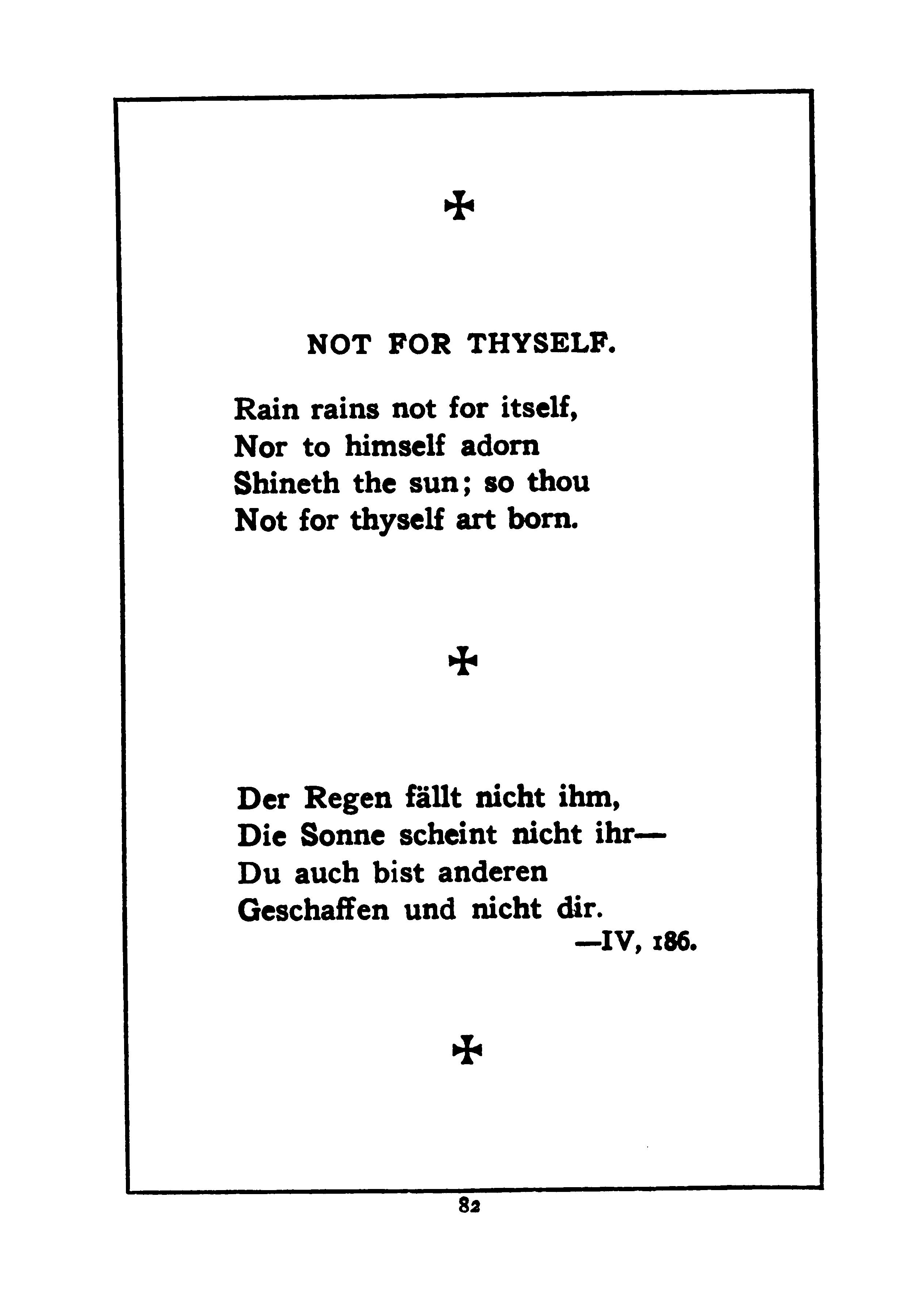
Communion giveth rest. It is from ownhood's state That pains and woes arise, War, persecution, hate.

Mittheilen schaffet Ruh. Bios aus der Eigenheit
Entstehet alles Weh:
Verfolgung, Krieg und Streit. V, 186.

Naught eise will ever thee To hell's deep jaws consign, Than the cursed heinous thought, Take heed! "The mine and thine."

Nichts andres stürzet dich In Höllenschlund hinein, Als das verhasste Wort Merks wohl ! das Mein und Dein. -V, 238.

The more thou thine own self Out of thyself dost throw, The more will into thee God with His Godhood flow.

Je mehr du dich aus dir Kannst austhun und entgiessen:
Je mehr muss Gott in dich Mit seiner Gottheit fliessen.
I, 138.

Walk out, God walketh in; To God live, die to thee ; Do naught, thy duty's done; Be not, and God will be.

Geh aus, so geht Gott ein:
Stirb dir, so lebst du Gott:

Sei nicht, so ist es er Thu nichts, so g'schicht's Gebot.
II, 136.
No exit but t'will cause To enter a new Start; I empty mine own seif, God comes to fill my heart.

Kein Ausgang, der geschieht, Als um des Eingangs willen Mein Herz entschüttet sich, Dass Gott es an soll füllen.
-V, 14.

A man of mind composed Is always one and free. How, between God and him, Can there a diff'rence be?

Ein grundgelassner Mensch
Ist ewig frei und ein Kann auch ein Unterschied An ihm und Gotte sein?
-II, 141.



The sea is sea throughout, E'en finest spray of sea.
Say how in God pure souls
Aught else but God may be!
Im Meer ist alles Meer, Auchs kleinste Tröpfelein
Sag, welche heilge Seel
In Gott nicht Gott wird sein. -VI, 173
My spirit's deep abyss
Ciamors with much ado
For God's abyss. Now which Is deeper of the two?
Der Abgrund meines Geists
Ruft immer mit Geschrei
Den Abgrund Gottes an.

Sag: welcher tiefer sei? -I, 68.


He who before the Lord With envy comes and hate, Will hatred with his prayers And envy impetrate.

Mensch, wer mit Hass und Neid Vor Gott den Herrn will treten, Der wird sich anders nichts Als Hass und Neid erbeten.
VI, 163.
Thy will 't is makes thee damned, Thy will that makes thee saved; Thy will that sets thee free, Thy will makes thee enslaved.

Der Will macht dich verlor'n, Der Will macht dich gefunden, Der Will, der macht dich frei, Gefesselt und gebunden.
VI, 82.


What you for others wish, You for yourself suggest. If you don't wish them well, Your own death you request.
Was du dem Nächsten willst, Das bittst du dir von Gott : Willst du nicht sein Gedeih'n, So bittst du dir den Tod.
VI, 164.

Oh tun for wisdom not, Nor wit, across the sea. On love alone depends The soul's true dignity.

Ach, lauf doch nicht nach Witz Und Weisheit übers Meer Der Seelen Würdigkeit Kommt blos von Liebe her. V, 291.

Thy wealth in thee must He. What thou hast not in thee, Were it the whole great world, A bürden would it be.


In dir muss Reichthum sein Was du nicht in dir hast, Wärs auch die ganze Welt, Ist dir nur eine Last.
-VI, 185.
ALL MUST BE ONE. Plurality God loathes, Therefore hath He decreed That all men should in Christ Be only one indeed.


Der Vielheit ist Gott feind: Drum zieht er uns so ein, Dass alle Menschen soll'n In Christo einer sein.
-V, 149.

Beware man of thyself, Self's bürden thou wilt rue. It will impair thee more Than thousand devils do.

Mensch, hüte dich vor dir! Wirst du mit dir beladen, Du wirst dir selber mehr Als tausend Teufel schaden.
-V, 144.
Three enemies has man: Himself, Satan, the world; The first will be the last That to the ground is hurled.

Drei Feinde hat der Mensch: Sich, Beizebub und Welt: Aus diesen wird der erst Am langsamsten gefällt.
-III, 333-

In Heaven life is good: No one has aught alone. What one possesses, there All others too will own.

Im Himmel lebt man wohl:
Niemand hat was allein, Was einer hat, das ist Den Seigen all'n gemein.
-V, 150.A soul redeemed and blessed No more knows otherhood. It is with God one light And one beatitude.

Die selge Seele weiss Nichts mehr von Anderheit, Sie ist ein Licht mit Gott Und eine Herrlichkeit.
IV, 181.





Had Christ a thousand times
Been born in Bethlehem
But not in thee, thy sin
Would still thy soul condemn.
Wird Christus tausendmal

Zu Bethlehem geboren

Und nicht in dir: du bleibst
Noch ewiglich verloren.
-I, 61.
God as a child is born In stillest, darkest night, Whereby He has restored What's lost by Adam's plight. Thus in a creature dark, Here in thy soul so still, God is becoming man And that will mend all ill.

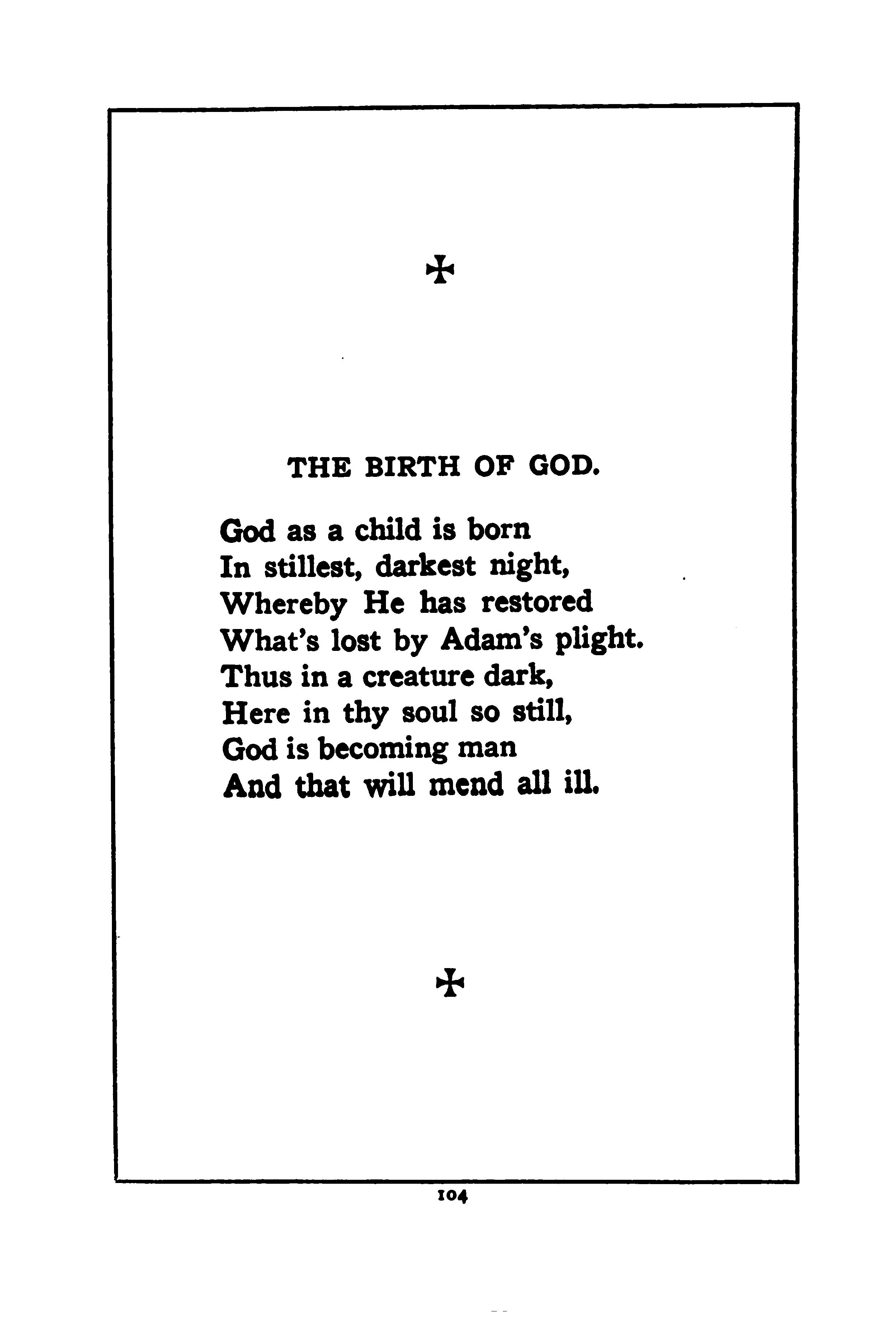
Merk: in der stillen Nacht Wird Gott ein Kind geboren, Und wiederum ersetzt, Was Adam hat verloren. Ist deine Seele still Und dem Geschöpfe Nacht, So wird Gott in dir Mensch Und alles widerbracht.

III, 8.

I say it speeds thee not That Christ rose from the grave, So long äs thou art still To death and sin a slave.

Ich sag, es hilft dir nicht, Dass Christus auferstanden, Wo du noch liegen bleibst In Sund und Todesbanden.
-I, 63.

Golgotha's cross from sin Can never ransom thee, Unless in thine own soul It should erected be.
Das Kreuz zu Golgatha


Kann dich nicht von dem Bösen, Wo es nicht auch in dir Wird aufgericht't, erlösen.
I, 62.
The resurrection is In spirit done in thee, As soon as thou from all Thy sins hast set thee free.

Die Auferstehung ist Im Geiste schon geschehn, Wenn du dich lässt entwirkt' Von deinen Sünden sehn.
-IV, 55-


Thou must above thee rise
All eise leave to God's grace: Then Christ's ascension will Within thy soul take place.

Wann du dich über dich
Erhebst und lässt Gott walten, So wird in deinem Geist
Die Himmelfahrt gehalten.
-IV, 56.

Man, thou shalt be St. Paul! In thee must be fulfilled What Christ has left undone And where wrath shall be stilled.
Mensch, du sollst Paulus sein Und in dir selbst erfüllen, Was Christus nicht gethan, Wo sich der Zorn soll stillen.
 V, 160.
V, 160.
Were e'en in Christ Himself, Some little will at all, However blessed He be, Surely from grace he'd fall.

Auch Christus, war in ihm
Ein kleiner eigner Wille, Wie selig er auch ist, Mensch, glaube mir, er fiele. -V, 32.


The highest worship is Like unto God to grow, Christlike to be in life, In habit, and love's glow.

Der höchste Gottesdienst Ist, Gotte gleiche werden, Christförmig sein an Lieb, Am Leben und Geberden.
-IV, 150.

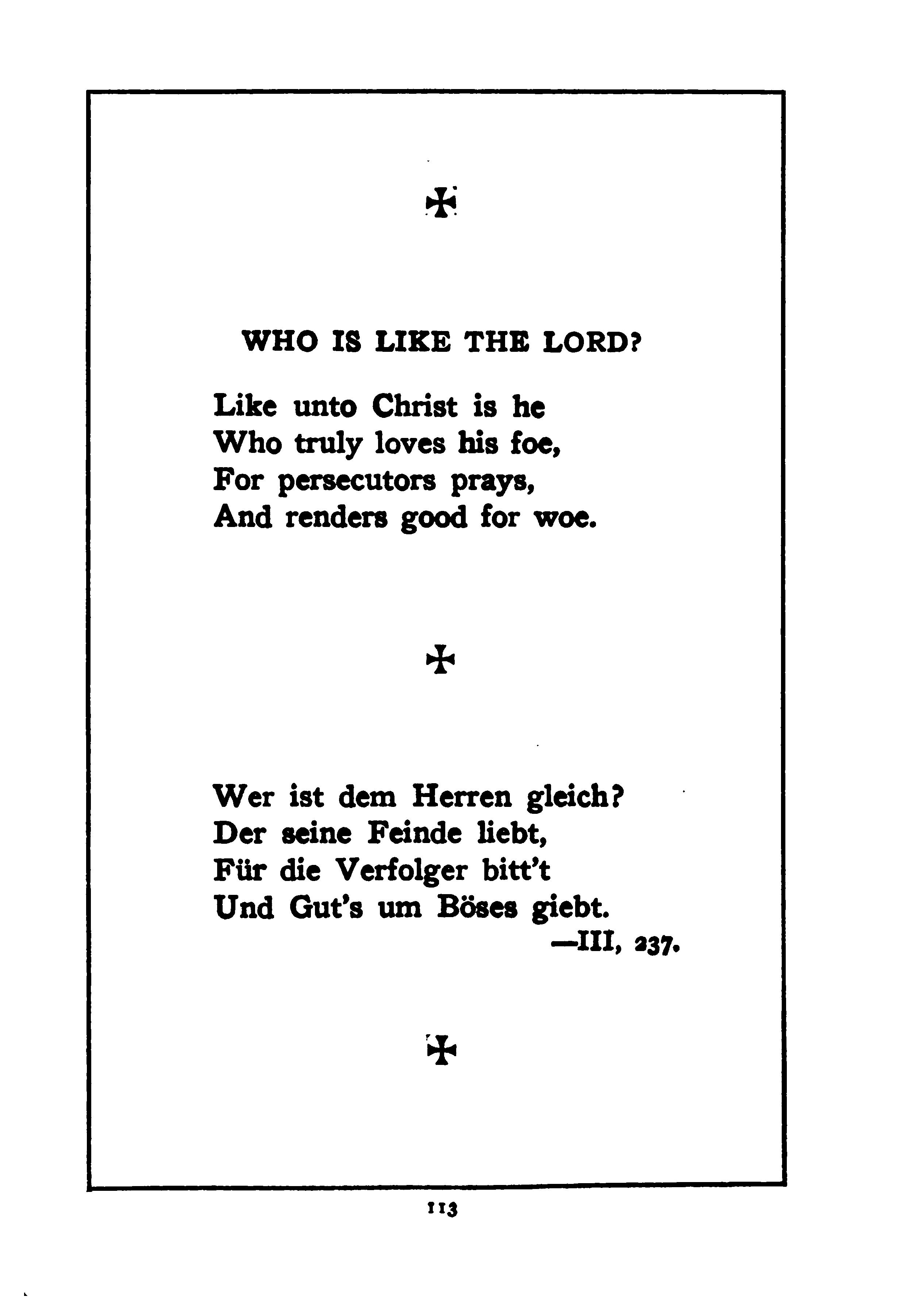
Like unto Christ is he Who truly loves his foe, For persecutors prays, And renders good for woe.
Wer ist dem Herren gleich? Der seine Feinde liebt, Für die Verfolger bitt't Und Gut's um Böses giebt.
-III, 237.
GOD'S KISS.
God kisseth but Himself. His Spirit is His kiss; The Son 't is who is kissed, The Father who does this.

Gott küsst sich in sich selbst, Sein KUSS, der ist sein Geist, Der Sohn ist, den er küsst, Der Vater, der's geleist't.
VI, 238.





Here must our deeds be done ! I don't believe such thing That who no kingdom wins Can ever be a king.

Hier muss es sein gethan! Ich bilde mir nicht ein, Dass, wer kein Reich erwirbt, Dort wird ein König sein.
-V, 89.

UNBURDENED.
Thy bündle throw away! Who wants to war and fight, Must bear no bag of gold; His shoulders must be light.

Wirf das Gebündle weg! Wer streiten soll und kriegen, Dem muss kein Sack voll Geld Auf seinen Achseln liegen.
VI, 67.

There's need of solitude! But wilt thou not commune, Thou'rt lonely everywhere As in a desert soon.
Die Einsamkeit ist noth, Doch sei nur nicht gemein, So kannst du überall In einer Wüsten sein.

-II, 117.

CONTEMPLATION.
You will have heav'n on earth, The sweetest life to live, If you yourself with love To contemplation give.

Der Himmel auf der Welt, Das allersüss'ste Leben Ist, der Beschaulichkeit Aus Liebe sein ergeben.
-V, 257.

Becom'st thou not a child, Thou enter'st not at all Where God's own children are; The door is much too small.

Mensch, wirst du nicht ein Kind, So gehst du nimmer ein, Wo Gottes Kinder sind Die Thür ist gar zu klein.

Simplicity I prize
If God hath giv'n it wit;

Unwise simplicity

Deserves the name no whit.
Die Einfalt schätz ich hoch, Der Gott hat Witz beschertDie aber den nicht hat, Ist nicht des Namens werth.
V, 286.
Simplicity means, not To be on baseness bent; But in the cause of good Humbly be diligent.


Ist, nichts von Schalkheit wissen, Aufs Gute blos allein In Demuth sein beflissen.
-V, 287.
Above thee lifteth thee But nihilatedness. Who most is turned to naught Will most of God possess.

Nichts bringt dich über dich, Als die Vernichtigkeit, Wer mehr vernichtigt ist, Der hat mehr Göttlichkeit.
II, 140.

MORE GOD THAN MAN. Who without feeling loves, Without cognition knoweth: He is more God than man And by that name he goeth.

Wer ohn Empfinden liebt Und ohn Erkennen kennt, Der wird mit gutem Recht Mehr Gott als Mensch genennt. -n, 59.

IMMOVABLE.
Whoso immovable In joy and pain hath proved, From God's own likeness he Can not be far removed.

Wer unbeweglich bleibt In Freud, in Leid, in Pein, Der kann nunmehr nicht weit Von Gottes Gleichheit sein. -l, 51.

Descend, man, sink thee down:

Thou risest frora thy place.
Cease thou from further walk: At once begins thy race.
Mensch senke dich herab
So steigest du hinauf;
Lass ab von deinem Gehn
So fängt sich an dein Lauf. -V, 278.


What shame! The silkworm works And works till he can fly, While you remain a man And still on earth will lie.
O Spott: ein Seidenwurm, Der wirkt, bis er kann fliegen, Und du bleibst, wie du bist, Nur auf der Erde liegen!
-VI, 32.

Pure as the finest gold, As rock so rigid hard And clear as crystal, keep The soul within thy guard.
Rein wie das feinste Gold, Steif wie ein Felsenstein, Ganz lauter wie Cristall, Soll dein Gemüthe sein.



If neither love nor pain Will ever touch thy heart, Then only God's in thee, And then in God thou art.
Mensch, wann dich weder Lieb Berührt, noch Leid verletzt, So bist du recht in Gott Und Gott in dich versetzt.
I, 293-

Who not with others bides And always lives alone, If he's not God himself, Must into God have grown.

Wer stets alleine lebt Und niemand wird gemein, Der muss, ist er nicht Gott, Gewiss vergottet sein.
II, 202.

Man should not stay a man: His aim should higher be. For God will only gods Accept äs Company.

Mensch, bleib doch nicht ein Mensch : Man muss aufs höchste kommen, Bei Gotte werden nur Die Götter angenommen. -V, 219.

Let mediation go!

If I'm to see my light, I want before my face No wall to check my sight.
Weg mit dem Mittelweg!

Soll ich mein Licht anschauen, So muss man keine Wand Vor mein Gesichte bauen.
-II, 43-
To what thou lov'st thou shalt Be changed through thine own dearth ; To God, if thou lov'st God, To earth, if thou lov'st earth.

Mensch, was du liebst, in das Wirst du verwandelt werden : Gott wirst du, liebst du Gott, Und Erde, liebst du Erden.
V, 200.

PREPARED FOR ANY FATE.
Who without God äs well As with Hirn e'er can be, He is at any rate A hero verily.

Wer Gott so leicht entbehr'n, Als leicht empfangen kann, Der ist auf allen Fall Ein rechter Heldenmann.
 -V, 367.
-V, 367.
THE


Abandon winneth God. But to abandon God Is an abandonment Which must seem very odd.
Gelassenheit fäht Gott: Gott aber selbst zu lassen, Ist ein Gelassenheit, Die wenig Menschen fassen. -II, 92.
My heart below is strait, On top 't is wide and stout. It must have room for God, But earthly things keep out.

Mein Herz is unten eng Und obenher so weit, Dass es Gott offen sei, Versperrt der Irdischkeit.
II, 82.

BE

God's veritable son
Is Christ and he alone. But every Christian must Be Christ, this only one.
Der wahre Gottessohn
Ist Christus nur allein; Doch muss ein jeder Christ
Derselbe Christus sein.
-V, 9.

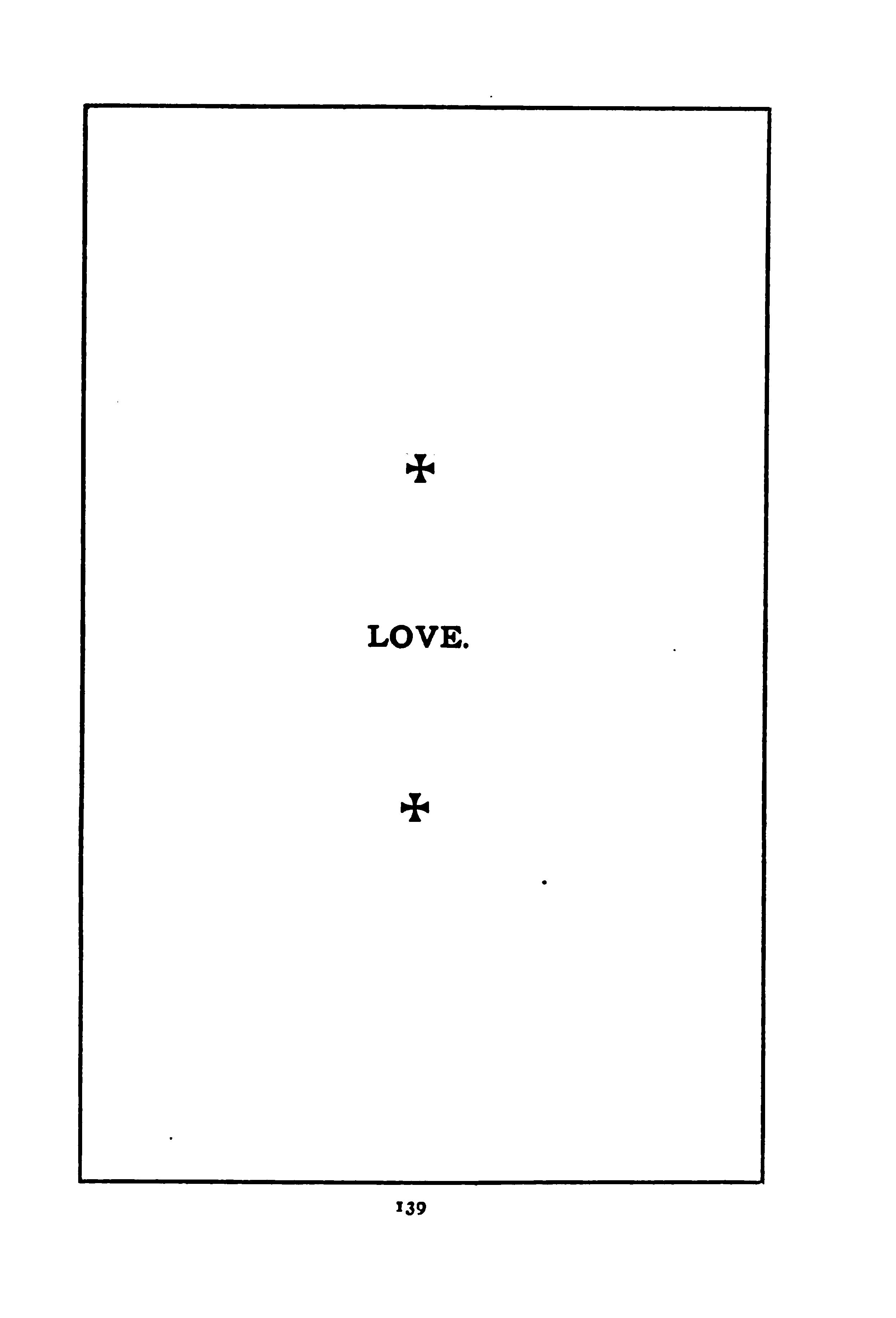



Love is the sage's stone ; It takes gold from the clod; It turns naught into aught, Transforms me into God.


Lieb' ist der Weisen Stein: Sie scheidet Gold aus Koth, Sie machet Nichts zu Ichts Und wandelt mich in Gott.
I, 244-

Would'st thou discern which Love Be false, which true and pure, Observe: false love seeks self Will not in grief endure.
Willst du die falsche Lieb Von wahrer unterscheiden, So schau: sie sucht sich selbst Und fället ab in Leiden.
V, 303-

Young love storms like new wine In wildest fermentation. Old love is still and clear, Strong through tranquilization.

Die Liebe, wenn sie neu, Braust wie ein junger Wein:
Je mehr sie alt und klar,

Je stiller wird sie sein.
V, 210.
What did eternal God
Before time had begun? He loved Himself und thus Begot He God, the Son.

Was that Gott vor der Zeit
In seinem ewgen Thron? Er liebete sich selbst Und zeugte seinen Sohn.
-III, 175-
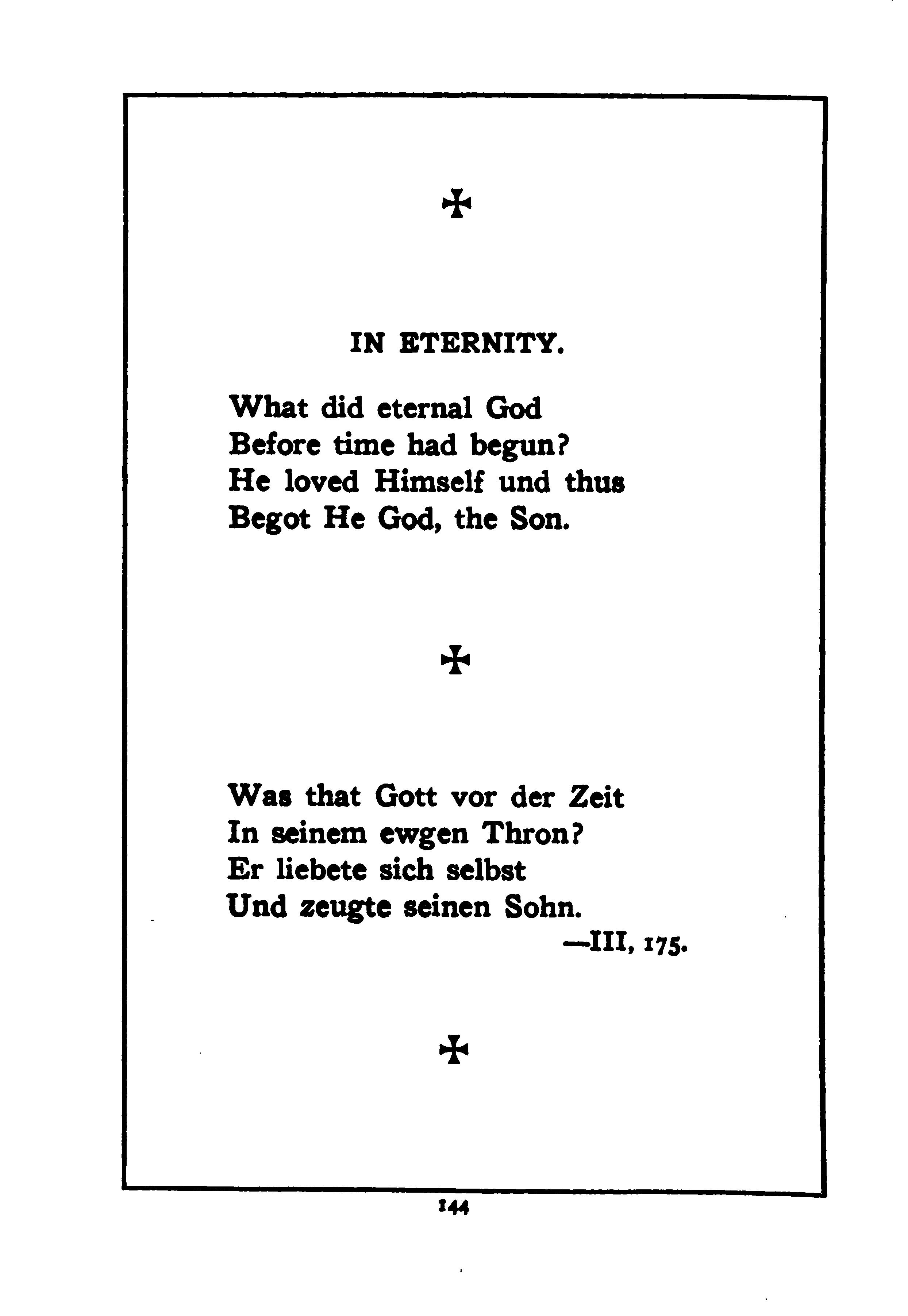

The nearest way to God

Leads through love's open door; The path of knowledge is Too slow for evermore.
Der nächste Weg zu Gott
Ist durch der Liebe Thür, Der Weg der Wissenschaft Bringt dich gar langsam für. V, 320.
LOVE'S PREROGATIVE. Into God's presence Love Quite unannounced will burst, While wit and learnedness Must antechamber first.
Die Liebe geht zu Gott Unangesagt hinein Verstand und hoher Witz MUSS lang im Vorhof sein.

-V, 307.

With but one kiss the bride Deserveth more of God Than hirelings may earn However much they plod.

Die Braut verdient sich mehr Mit einem KUSS um Gott, Als alle Miethlinge Mit Arbeit bis in Tod.
-V, 299.
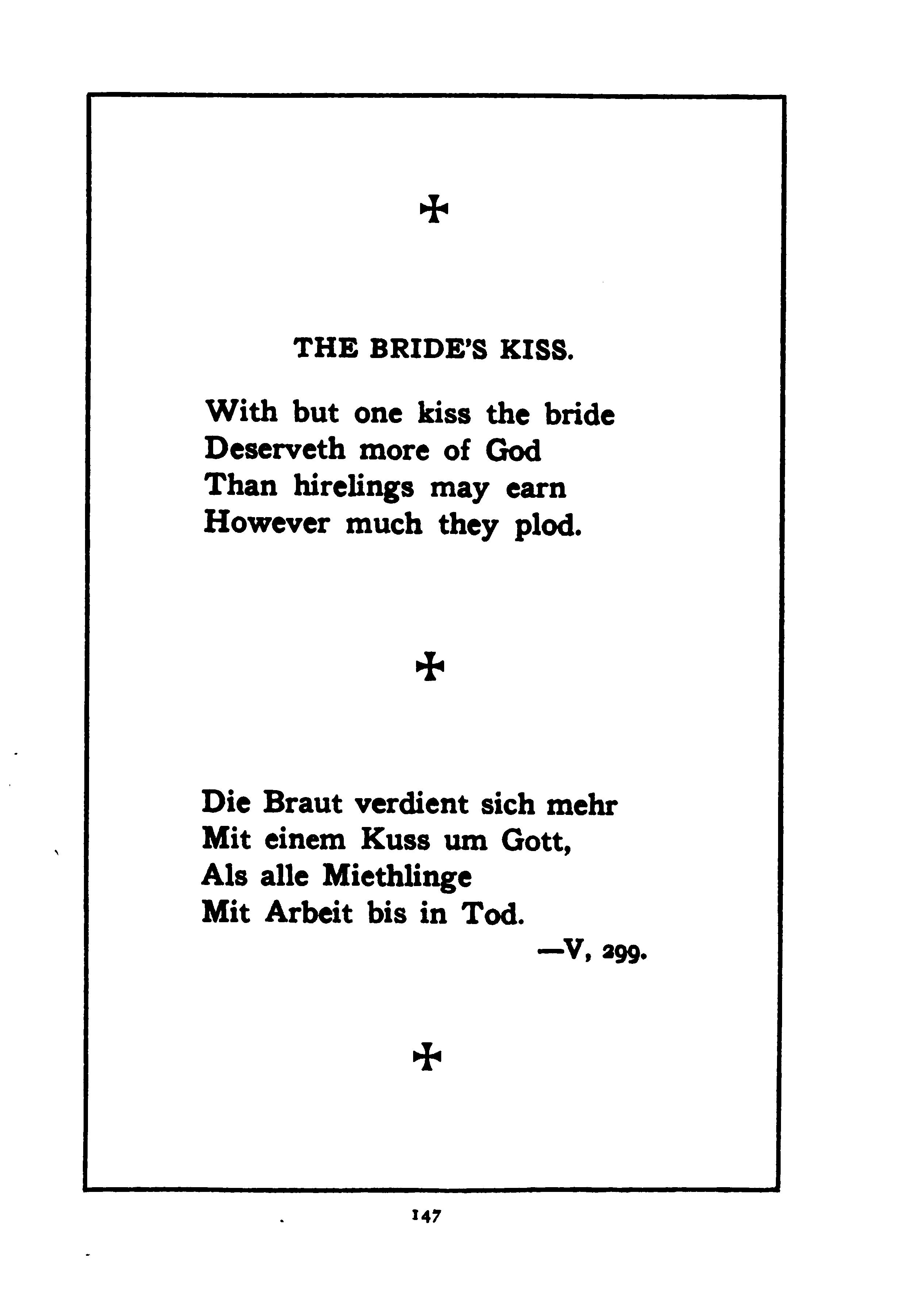
If thy soul virgin be, And like Maria pure, It soon will pregnant be As God's own paramour.

Ist deine Seele Magd Und wie Maria rein, So muss sie augenblicks Von Gotte schwanger sein.
II, 104.

Will pregnant be of God: His spirit verily

O'ershadow must my soul To quicken God in me.
Ich muss Gott's schwanger sein : Sein Geist muss ob mir schweben Und Gott in meiner Seel Wahrhaftig machen leben.
II, ioi.



Love maketh bold; and he Who God, the Lord, will kiss, With love alone should kneel Before His throne of Bliss.
Die Liebe macht uns kühn : Wer Gott den Herrn will küssen, Der fället ihm nur bloss Mit seiner Lieb zu Füssen.
-VI, 245-

Child, be the bride of God, And be thou His alone.
Thou shalt His sweetheart be, As He's thy lover grown.
Kind, werde Gottes Braut, Entbeut dich ihm allein ; Du wirst sein's Herzens Schatz Und er dein Liebster sein.
II, 108.


The angels are in bliss, But better is man's life, For no one of their kind Can ever be God's wife.

Den Engeln geht es wohl ; Noch besser uns auf Erden, Denn keiner ihr's Geschlechts
Kann Gott's Gemahlin werden.
III, 121.
You ask what manhood is?
'T is plainly understood, For in a word it is The Over-angelhood.


Fragst du, was Menschheit sei?
Ich sage dir bereit:
Es ist, mit einem Wort, Die Ueber-Engelheit.
-II, 44.

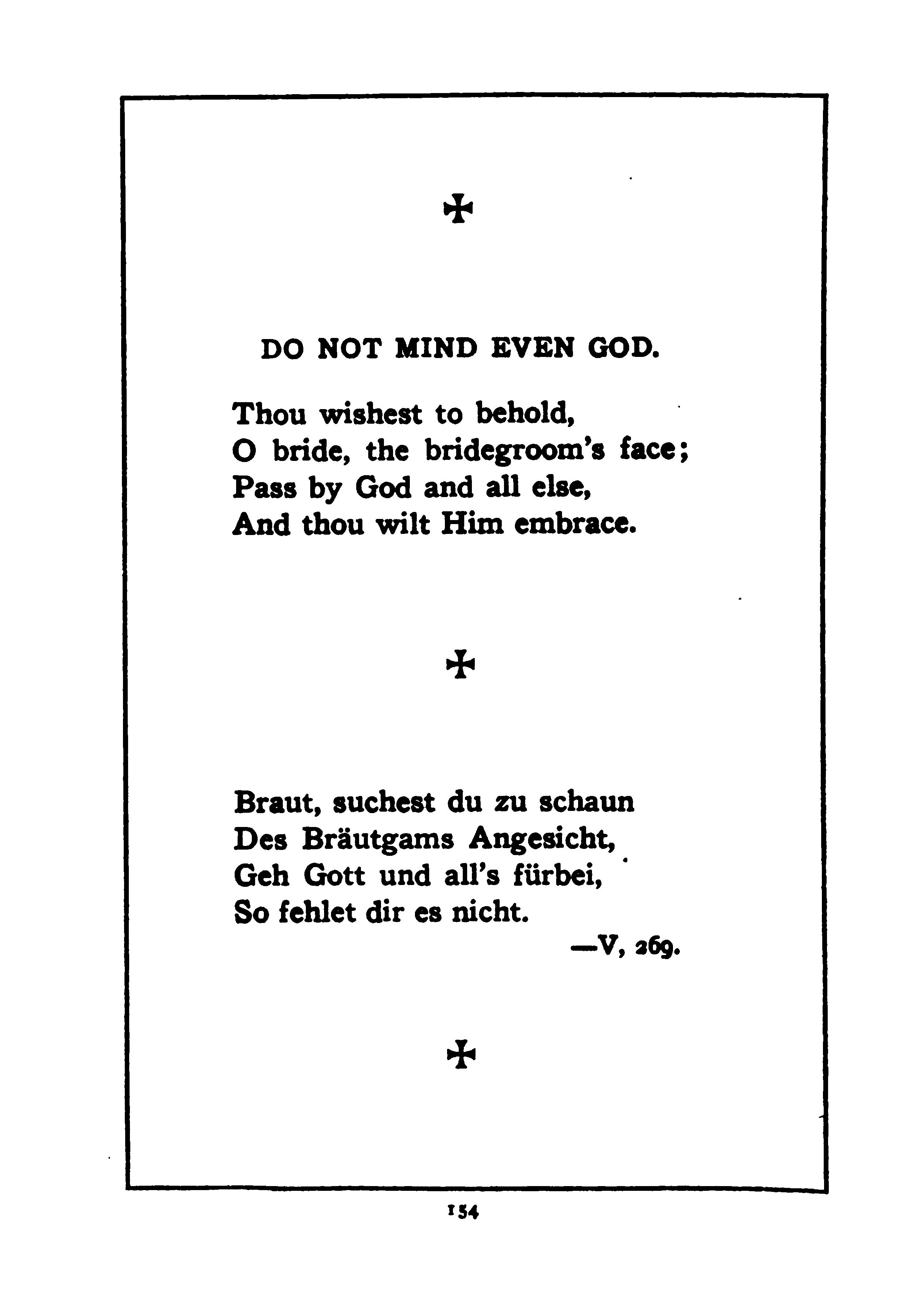
Thou wishest to behold, O bride, the bridegroom's face; Pass by God and all eise, And thou wilt Hirn embrace.
Braut, suchest du zu schaun Des Bräutgams Angesicht, Geh Gott und all's fürbei, So fehlet dir es nicht.
-V, 269.

The God-enraptured man One only pain hath he; He can not soon enough With God his Lover be.
Der gottverliebte Mensch Hat sonsten keine Pein, Als dass er nicht kann bald Bei Gott dem Liebsten sein. -IV, 135.

To bear a child is joy: God's sole bliss is that He Brings forth His only Son From all eternity.
Gebärn ist selig sein. Gotts ein'ge Seligkeit


Ist, dass er seinen Sohn Gebiert von Ewigkeit.
VI, 133.

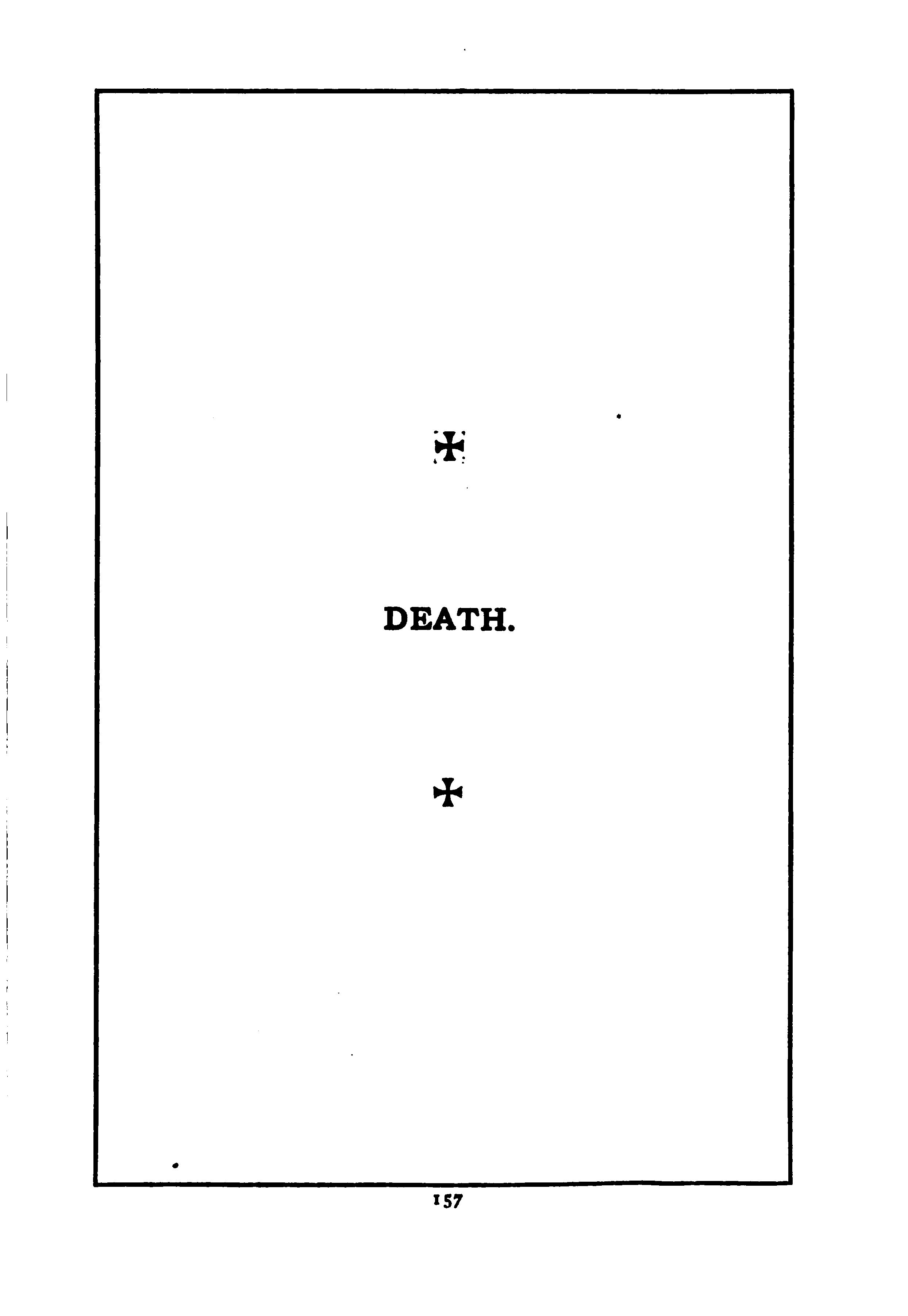


Like unto Death is Love ; It deadens all my sense, It breaks in me my heart And leads my spirit hence.
Die Lieb ist wie der Tod: Sie tötet meine Sinnen, Sie brichet mir das Herz Und führt den Geist von hinnen.

IV, 29.

Of sleep there are three kinds: Sinners are death-oppressed, The faint in nature lie, In God true lovers re st.

Der Schlaf ist dreierlei: Der Sünder schläft im Tod, Der Müd' in der Natur, Und der Verliebt' in Gott. -V. 248.


If thou art great, my friend, Then do not stop nor stay: From one light, thou must go Unto another day.

Freund, so du etwas bist, So bleib doch ja nicht stehn: Man muss aus einem Licht Fort in das andre gehn.
-III, 232.

What I became I was, What I have been I'll be. Such, soul and body healed, I'll be eternally.
Ich ward das was ich war, Und bin, was ich gewesen, Und werd es ewig sein, Wann Leib und Seel genesen.
I, 203.

Man should essential be; For, when this world is gone, All accident is past, The essence still lives on.

Mensch werde wesentlich; Denn, wenn die Welt vergeht, So fällt der Zufall weg Das Wesen, das besteht.

O Christian, once must thou Down into Hell be led. If not while still in life, Then goest there when dead.


Christ, einmal muss man doch Im Schlund der Höllen sein: Gehst du nicht lebendig, So musst du tot hinein.
-V, 263.
All accident must go, And false appearance, too.

Essence thou must become Without an earthly hue.
Der Zufall muss hinweg Und aller falsche Schein Du musst ganz wesentlich Und ungefärbet sein!
I, 274.

Trust me, my friend, if God Should bid me not to dwell In Heaven, I'd stay here Or be as lief in Hell.

Freund, glaub es : heisst mich Gott Nicht in den Himmel gehn, So will ich lieber hier, Auch in der Höllen stehn.
II, 133-

Who would expect it so?
From darkness light is brought, Life rises out of Death, and Something comes from Naught.

Wer hätte das vermeint!
Aus Finsterniss kommt's Licht, Das Leben aus dem Tod, Das Etwas aus dem Nicht.
-IV, 163.

When quitting time, I am Myself eternity.
I shall be one with God, God one with me shall be.

Ich selbst bin Ewigkeit, Wann ich die Zeit verlasse, Und mich in Gott und Gott In mich zusammenfasse.-I, 1

I don't believe in death. Though hour for hour I die, Each time upon each death To better life I hie.

Ich glaube keinen Tod

Sterb ich gleich alle Stunden, So hab ich jedesmal
Ein besser Leben funden. -I, so.


Ich sage, weil allein
Der Tod mich machet frei, Dass er das beste Ding Aus allen Dingen sei.
I do declare that death, Because he makes me free, The best thing in the world, The very best must be.
-I, 35-
NO DEATH, NO LIFE.

E'en God must die, Himself, That you may live thereby. How can you gain His life

Unless like Hirn you die?
Gott selber, wenn er dir
Will leben, muss er sterben: Wie denkst du ohne Tod
Sein Leben zu ererben?
I, 33-

Death is a blessed thing! The strenger death chastises, The much more glorious is The life that therefrom rises.
Tod is ein selig Ding: Je kräftiger er ist, Je herrlicher daraus Das Leben wird erkiest. I,

Oh ponder well on death! Too many things you try!
Naught can more useful be, Than how one means to die.
Denk an den Tod, mein Christ:


Was denkst du anders viel?
Man denkt nichts nützlicher's, Als wie man sterben will.
-IV, 107.
Friend it is now enough. In case thou more wilt read: Thou must become the script, The essence eke, indeed.
Freund, es ist auch genug. Im Fall du mehr willst lesen, So geh und werde selbst Die Schrift und selbst das Wesen. -VI, 263.





